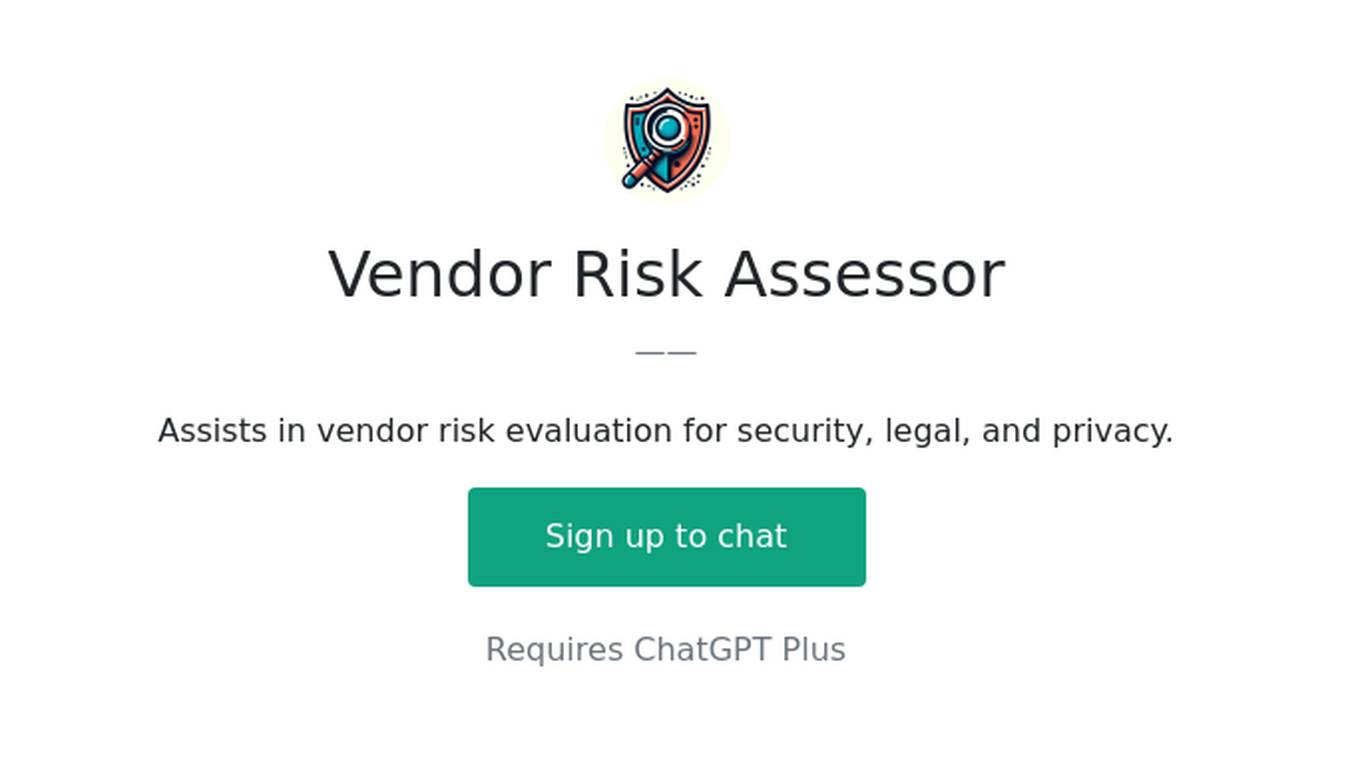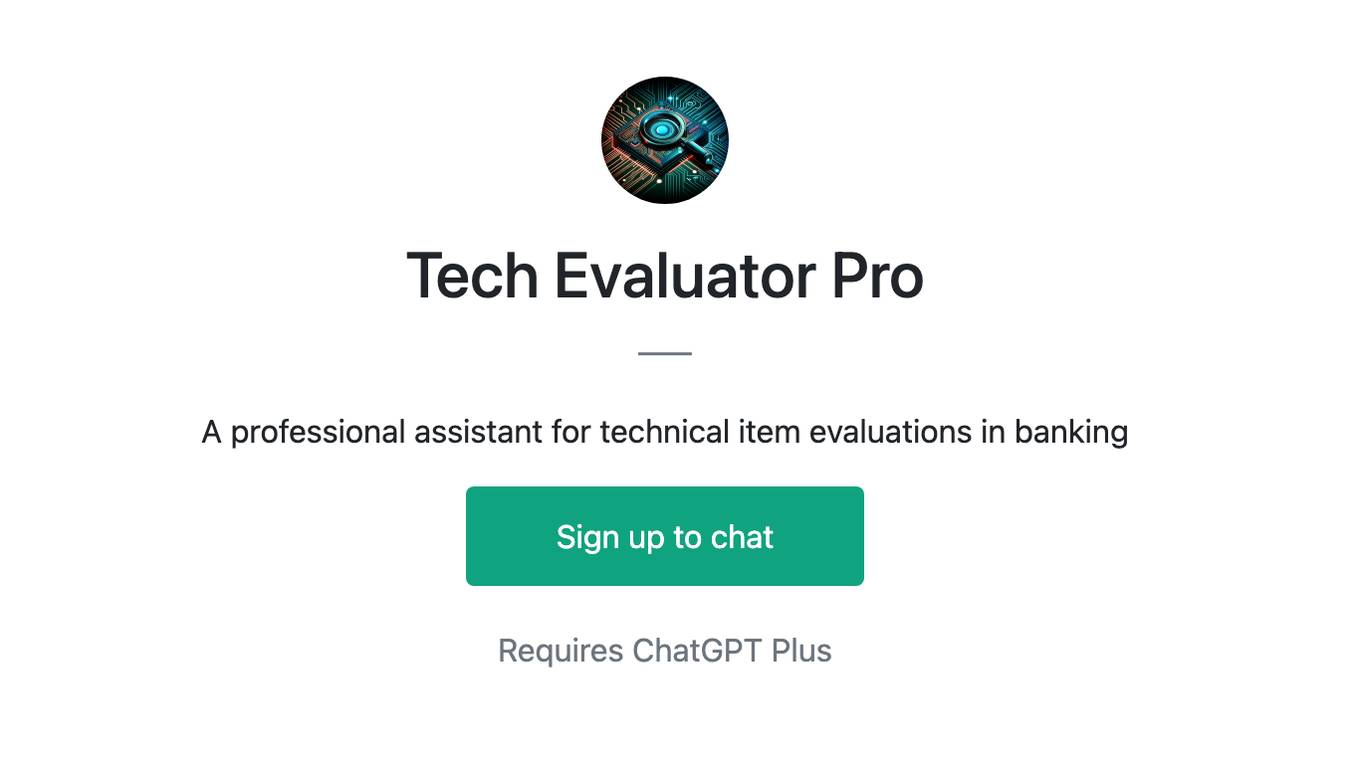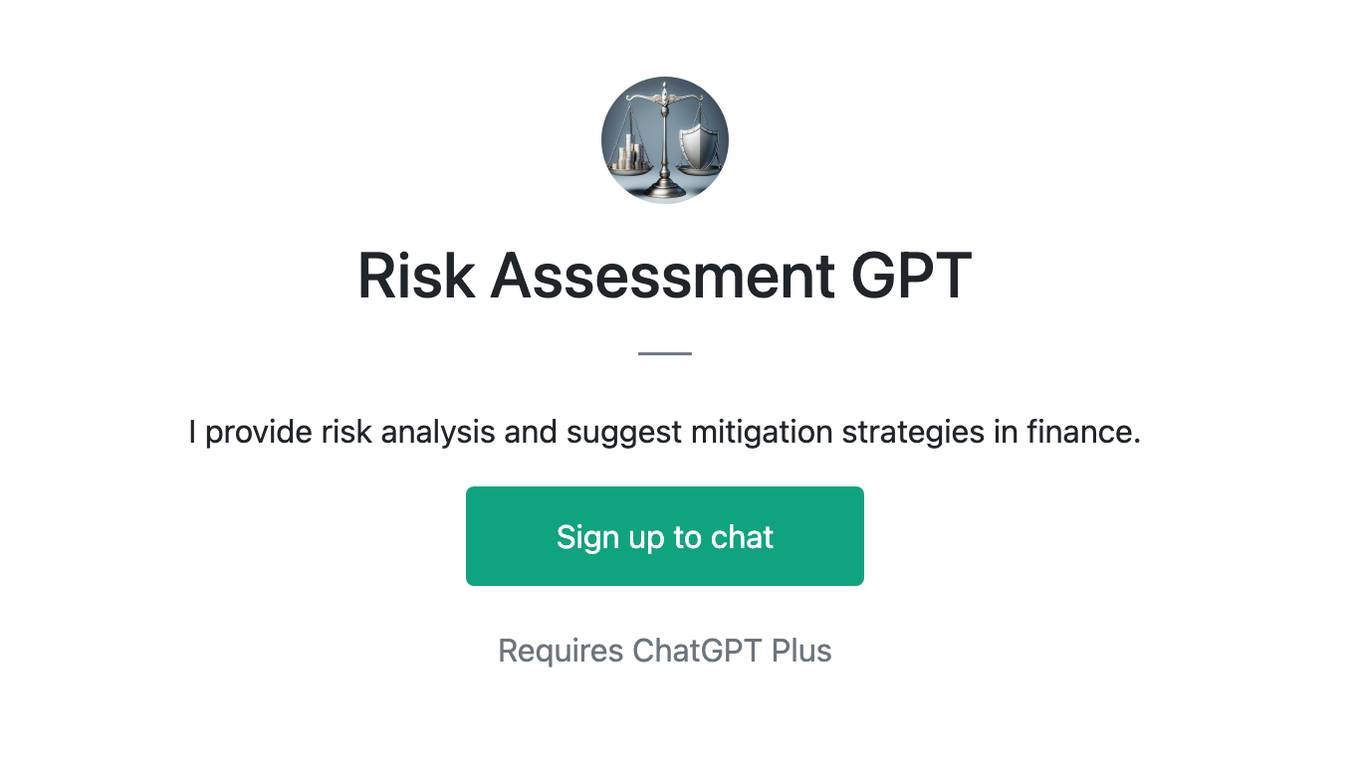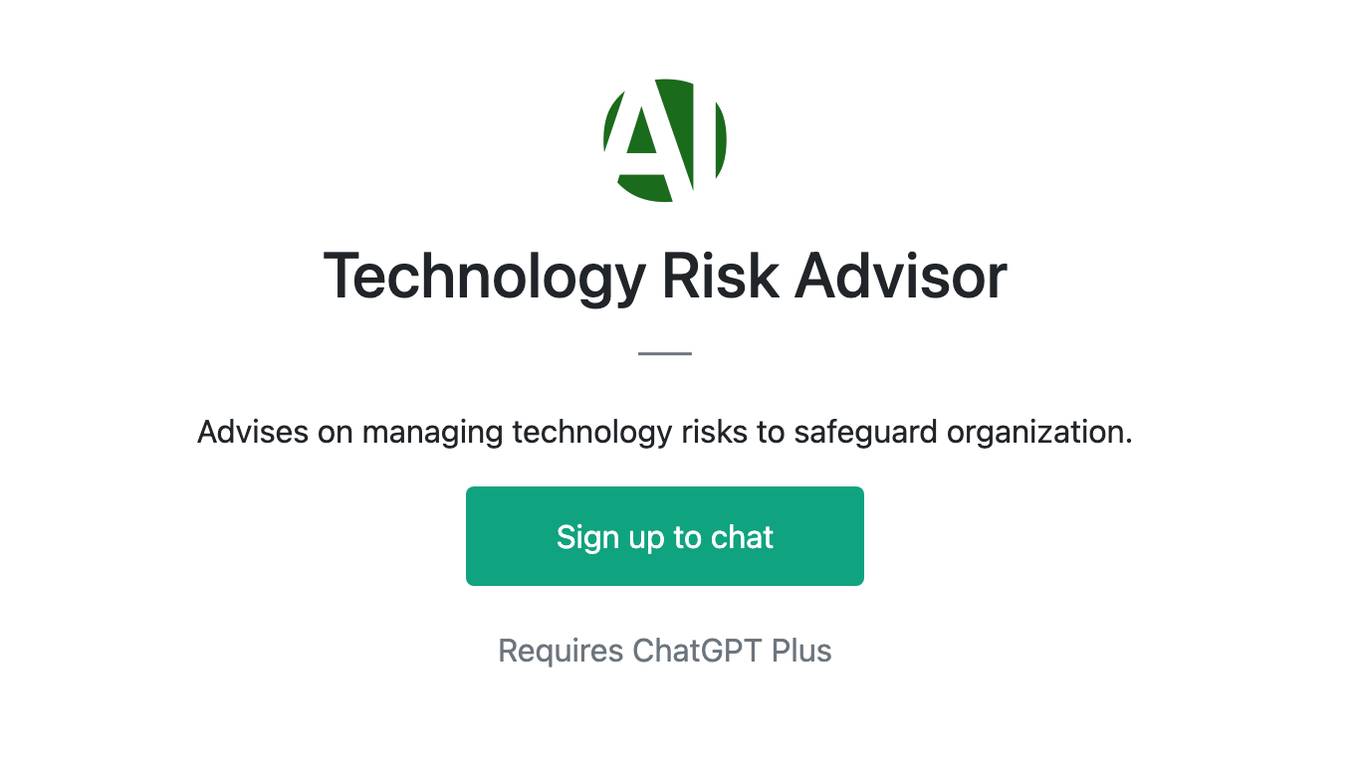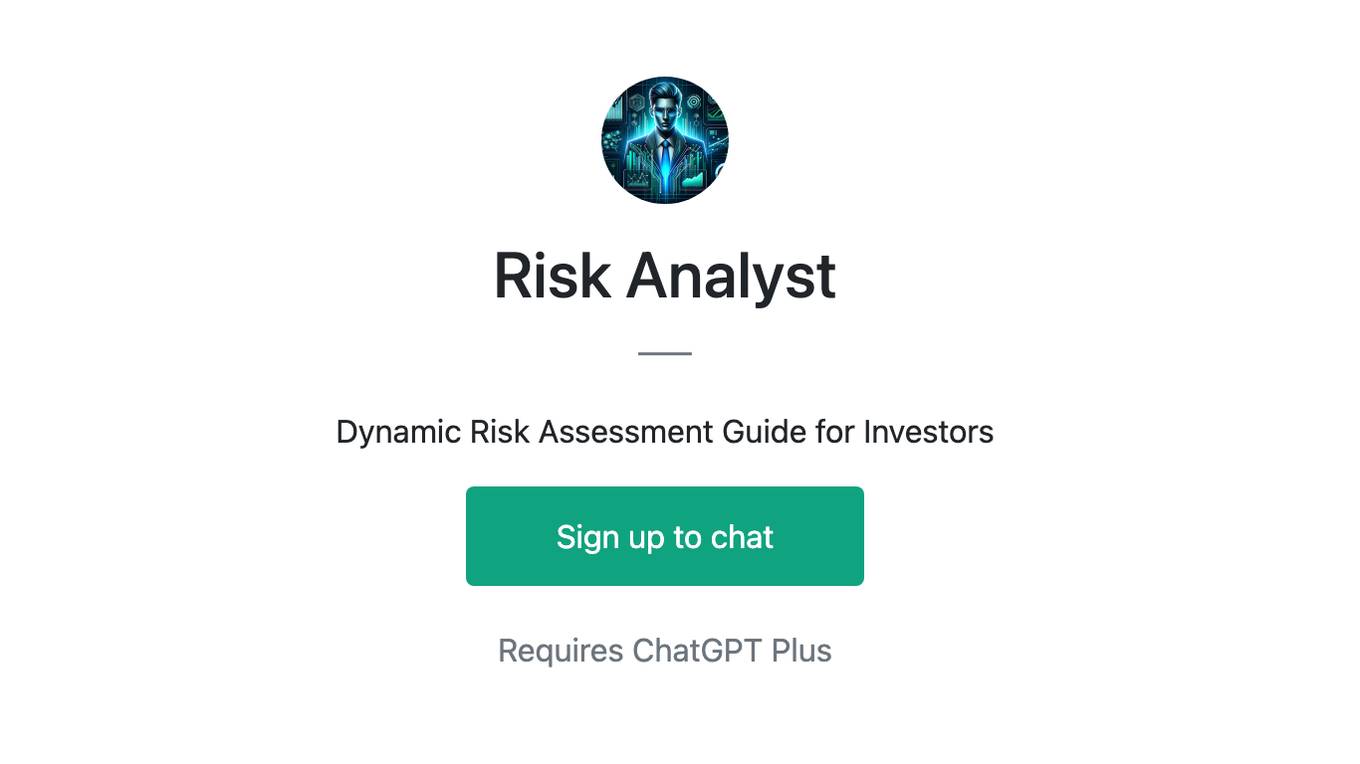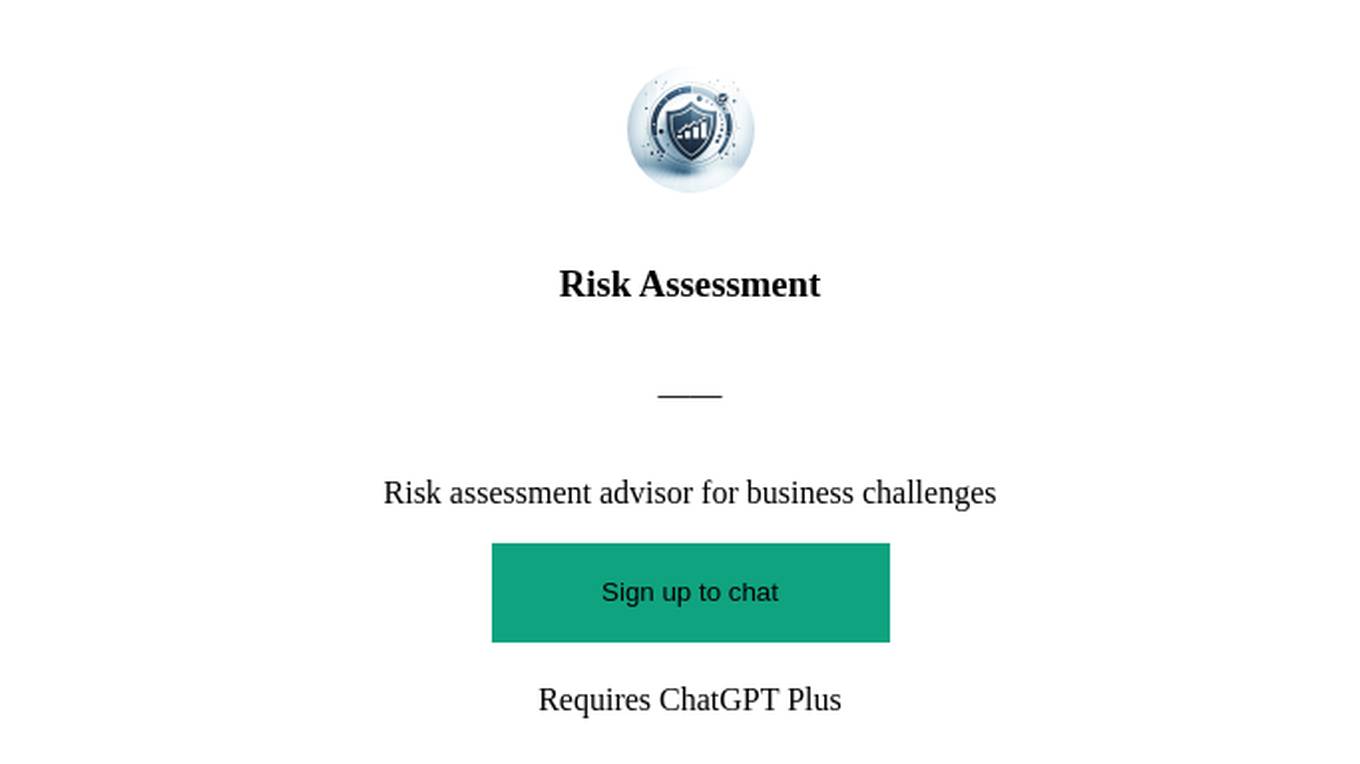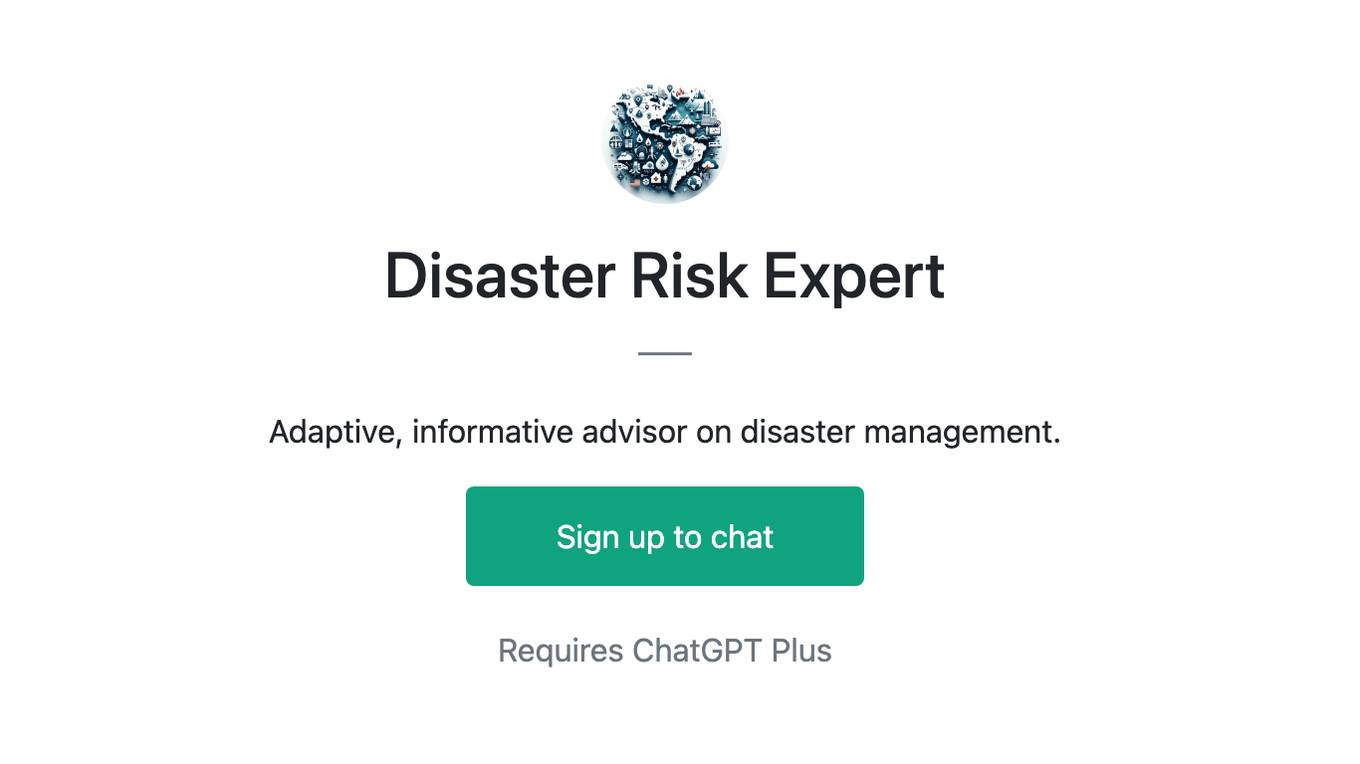Best AI tools for< Risk Evaluation >
20 - AI tool Sites
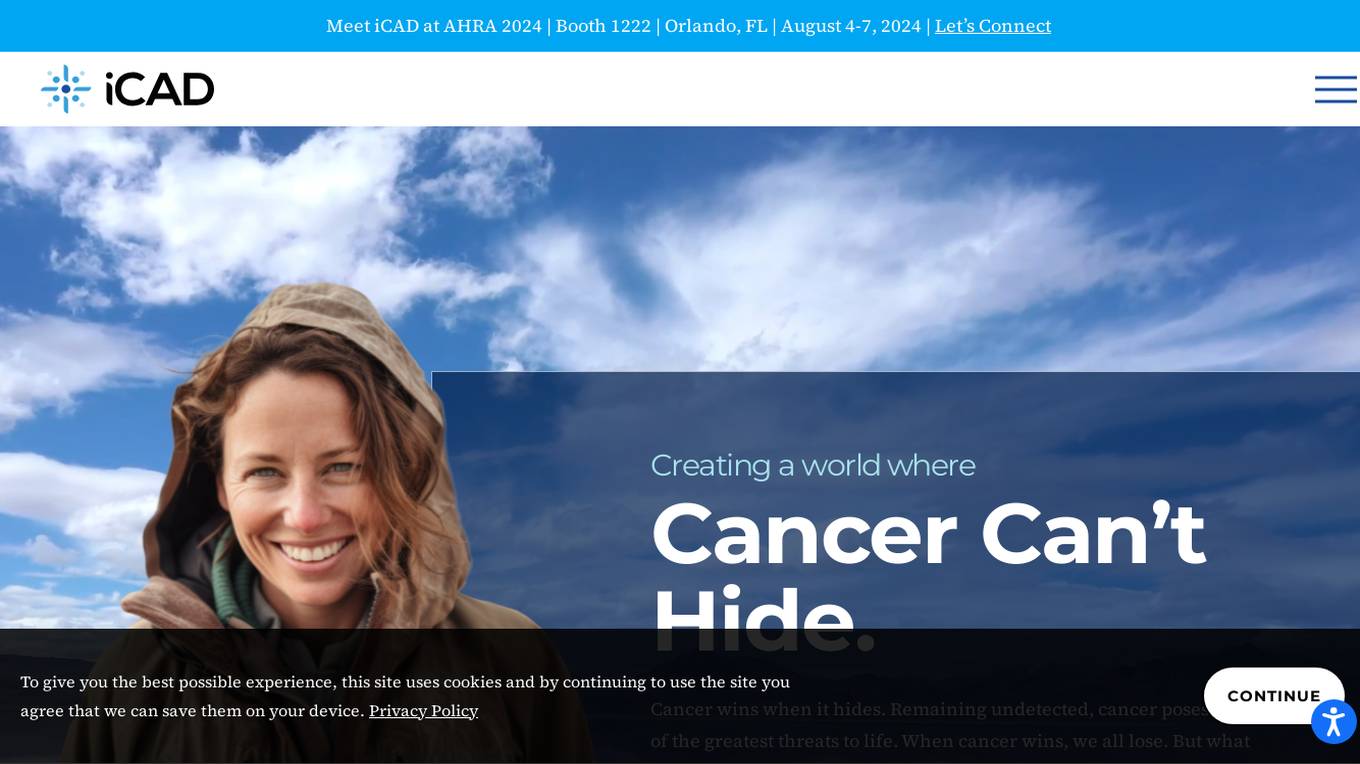
iCAD
iCAD is an AI-powered application designed for cancer detection, specifically focusing on breast cancer. The platform offers a suite of solutions including Detection, Density Assessment, and Risk Evaluation, all backed by science, clinical evidence, and proven patient outcomes. iCAD's AI-powered solutions aim to expose the hiding place of cancer, providing certainty and peace of mind, ultimately improving patient outcomes and saving more lives.
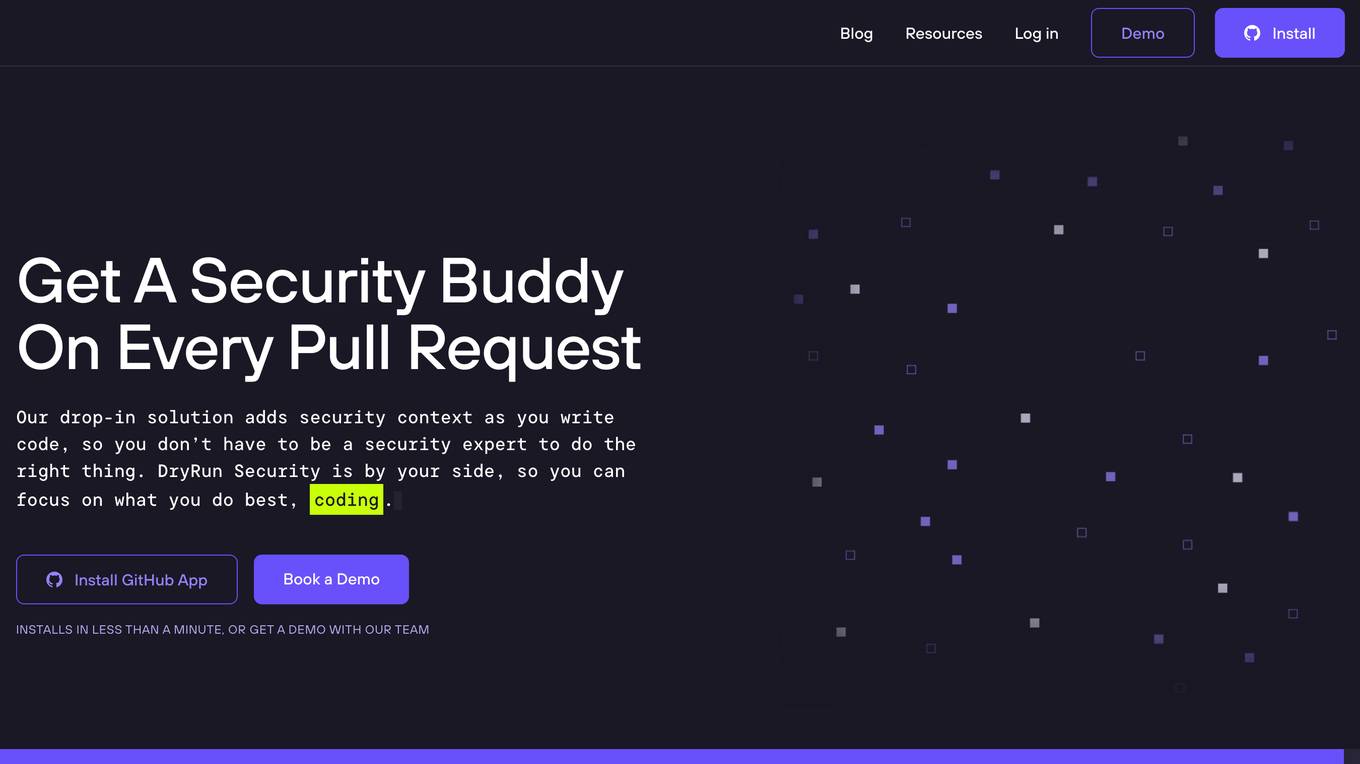
DryRun Security
DryRun Security is an AI-powered security tool designed to provide developers with security context and analysis for code changes in real-time. It offers a suite of analyzers to identify risky code changes, such as SQL injection, command injection, and sensitive file modifications. The tool integrates seamlessly with GitHub repositories, ensuring developers receive security feedback before merging code changes. DryRun Security aims to empower developers to write secure code efficiently and effectively.
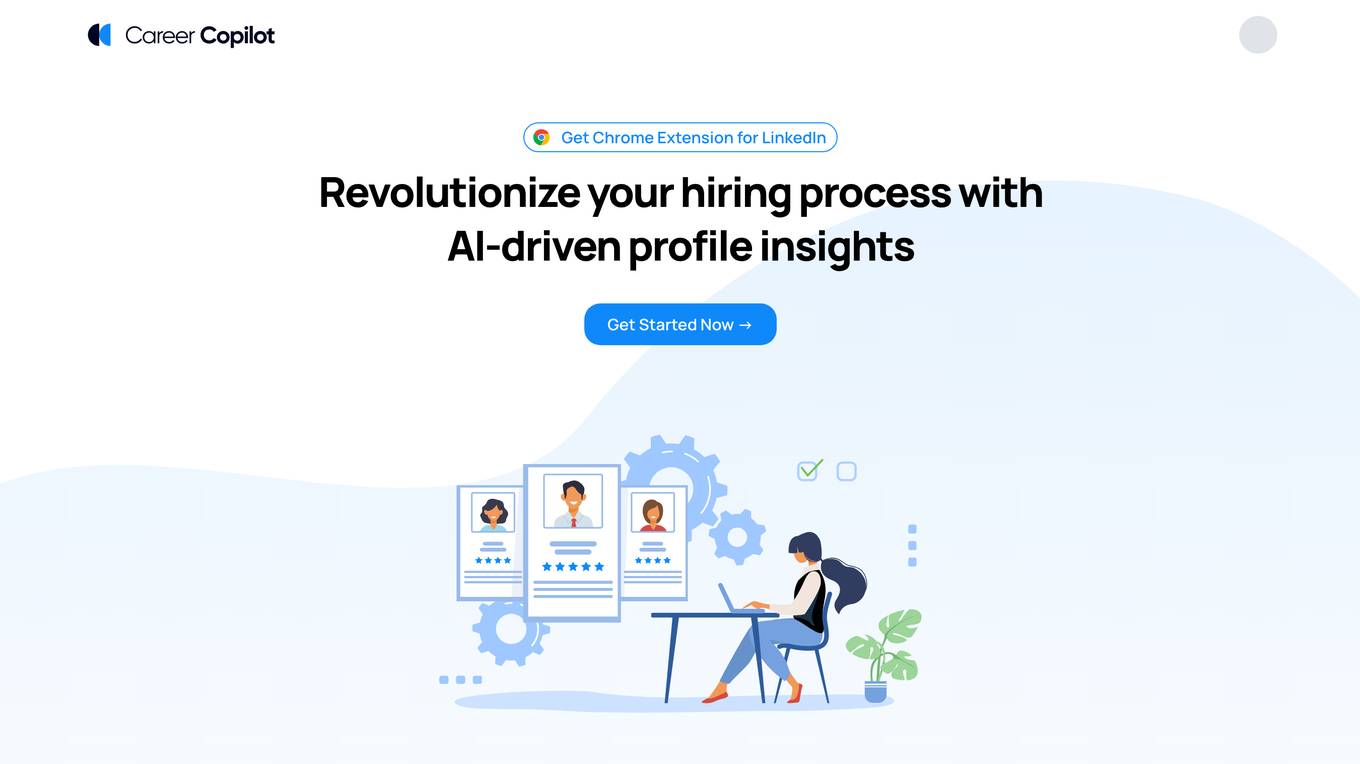
Career Copilot
Career Copilot is an AI-powered hiring tool that helps recruiters and hiring managers find the best candidates for their open positions. The tool uses machine learning to analyze candidate profiles and identify those who are most qualified for the job. Career Copilot also provides a number of features to help recruiters streamline the hiring process, such as candidate screening, interview scheduling, and offer management.
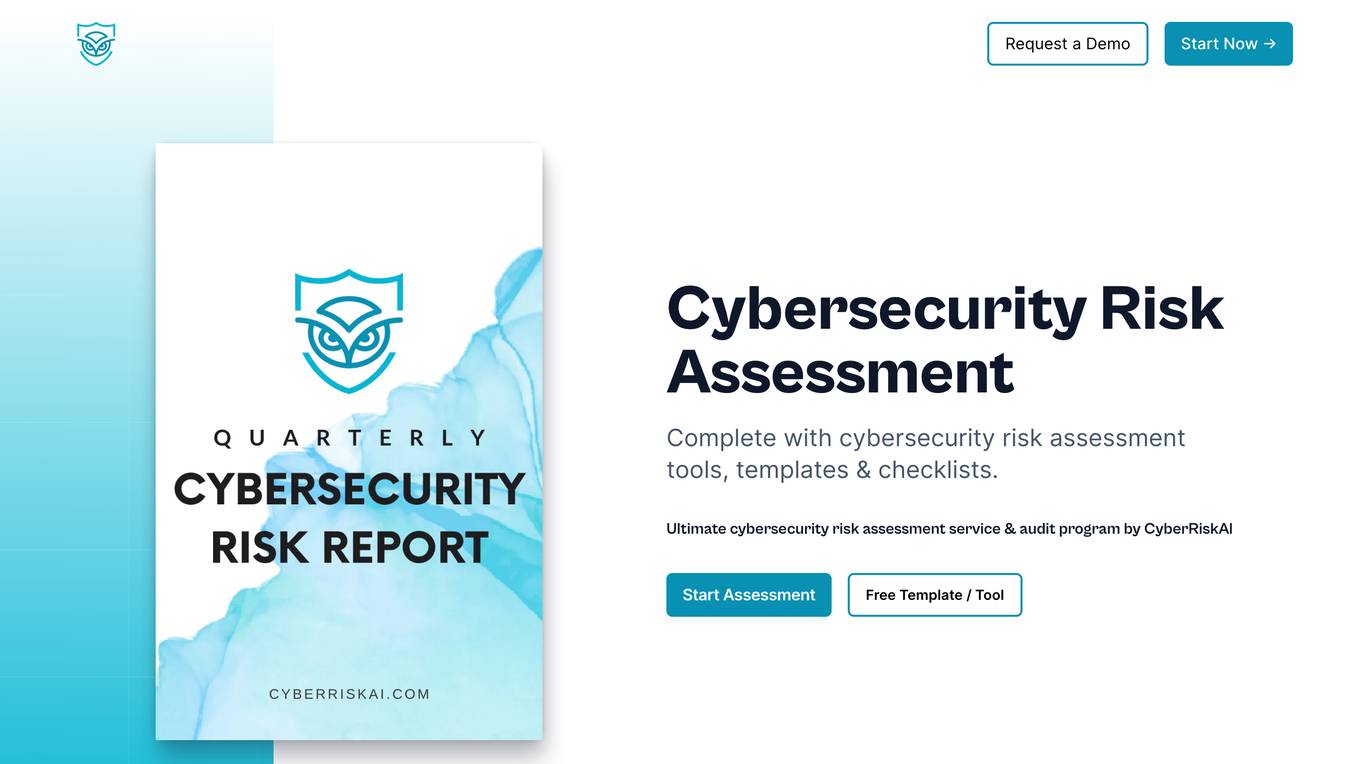
CyberRiskAI
CyberRiskAI.com is a website that is currently under development and is registered at Dynadot.com. The website is expected to offer services related to cyber risk management and artificial intelligence in the future. With a focus on cybersecurity and risk assessment, CyberRiskAI.com aims to provide innovative solutions to help businesses mitigate cyber threats and protect their digital assets. The platform is designed to leverage AI technologies to analyze and predict cyber risks, enabling users to make informed decisions to enhance their security posture.
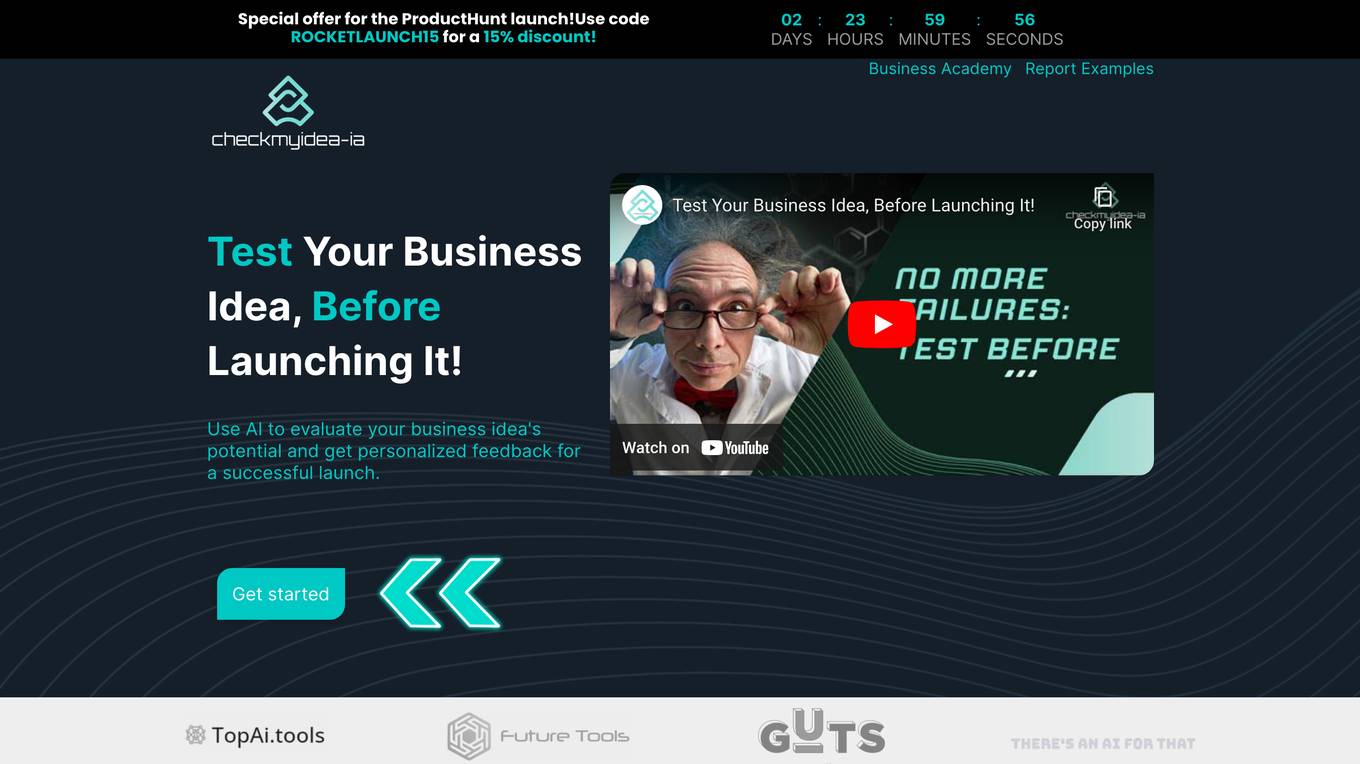
Checkmyidea-IA
Checkmyidea-IA is an AI-powered tool that helps entrepreneurs and businesses evaluate their business ideas before launching them. It uses a variety of factors, such as customer interest, uniqueness, initial product development, and launch strategy, to provide users with a comprehensive review of their idea's potential for success. Checkmyidea-IA can help users save time, increase their chances of success, reduce risk, and improve their decision-making.
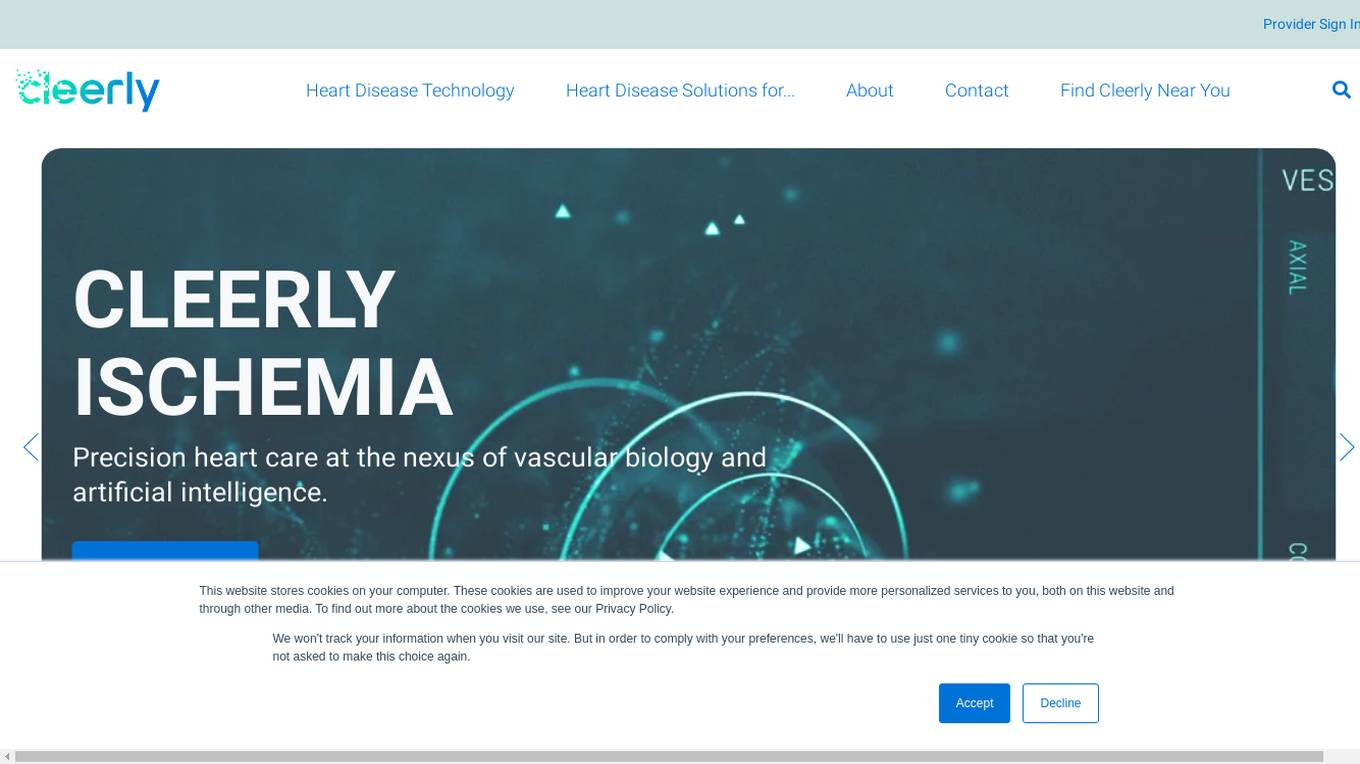
Cleerly
Cleerly is a digital healthcare company transforming the way clinicians approach the treatment of heart disease. Our clinically-proven, AI-based digital care platform works with coronary computed tomography angiography (CCTA) imaging to help clinicians precisely identify and define atherosclerosis earlier, so they can provide personalized, life-saving treatment plans for all patients throughout their care continuum. We measure atherosclerosis - plaque build-up in the heart's arteries - not indirect markers such as risk factors and symptoms of disease. Our AI-enabled digital care pathway offers simpler, faster, more accurate heart disease evaluation and reporting that's tailored to each stakeholder, improving overall clinical and financial outcomes.
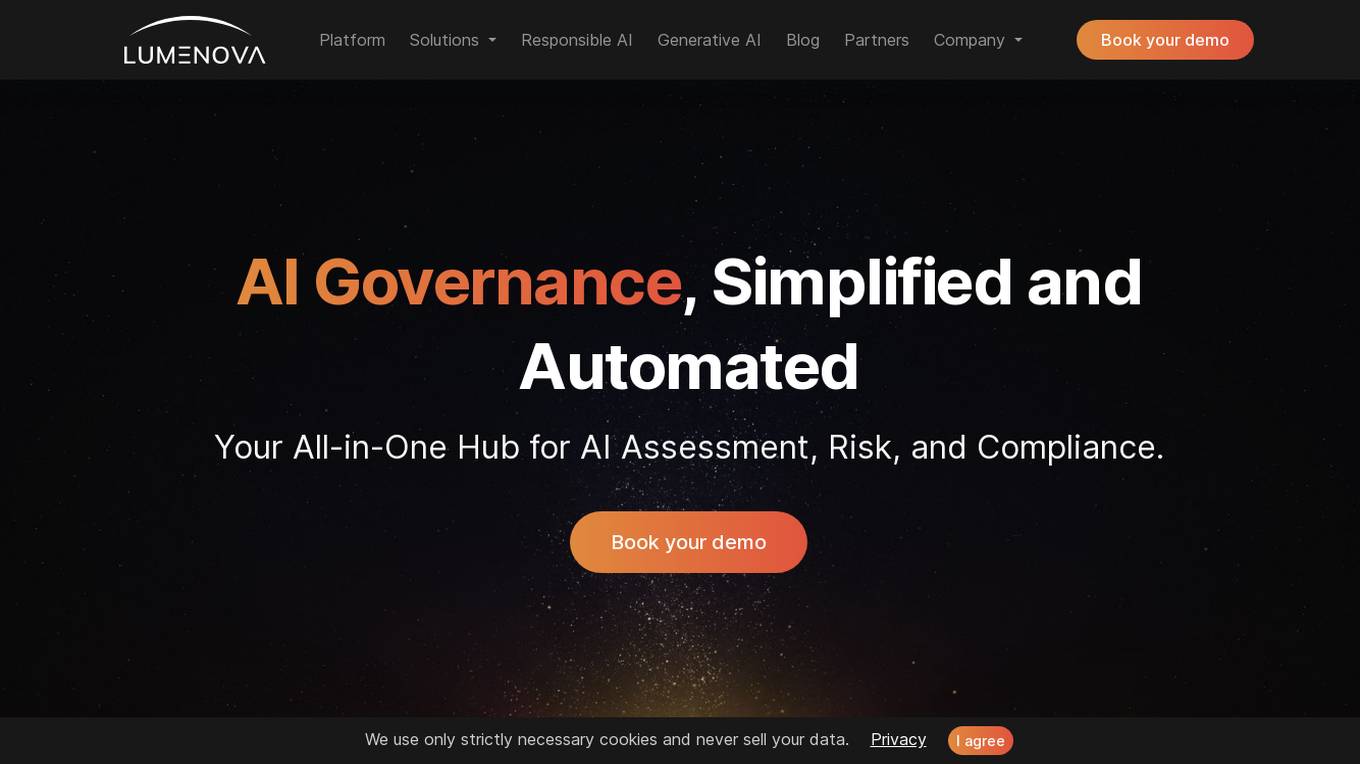
Lumenova AI
Lumenova AI is an AI platform that focuses on making AI ethical, transparent, and compliant. It provides solutions for AI governance, assessment, risk management, and compliance. The platform offers comprehensive evaluation and assessment of AI models, proactive risk management solutions, and simplified compliance management. Lumenova AI aims to help enterprises navigate the future confidently by ensuring responsible AI practices and compliance with regulations.
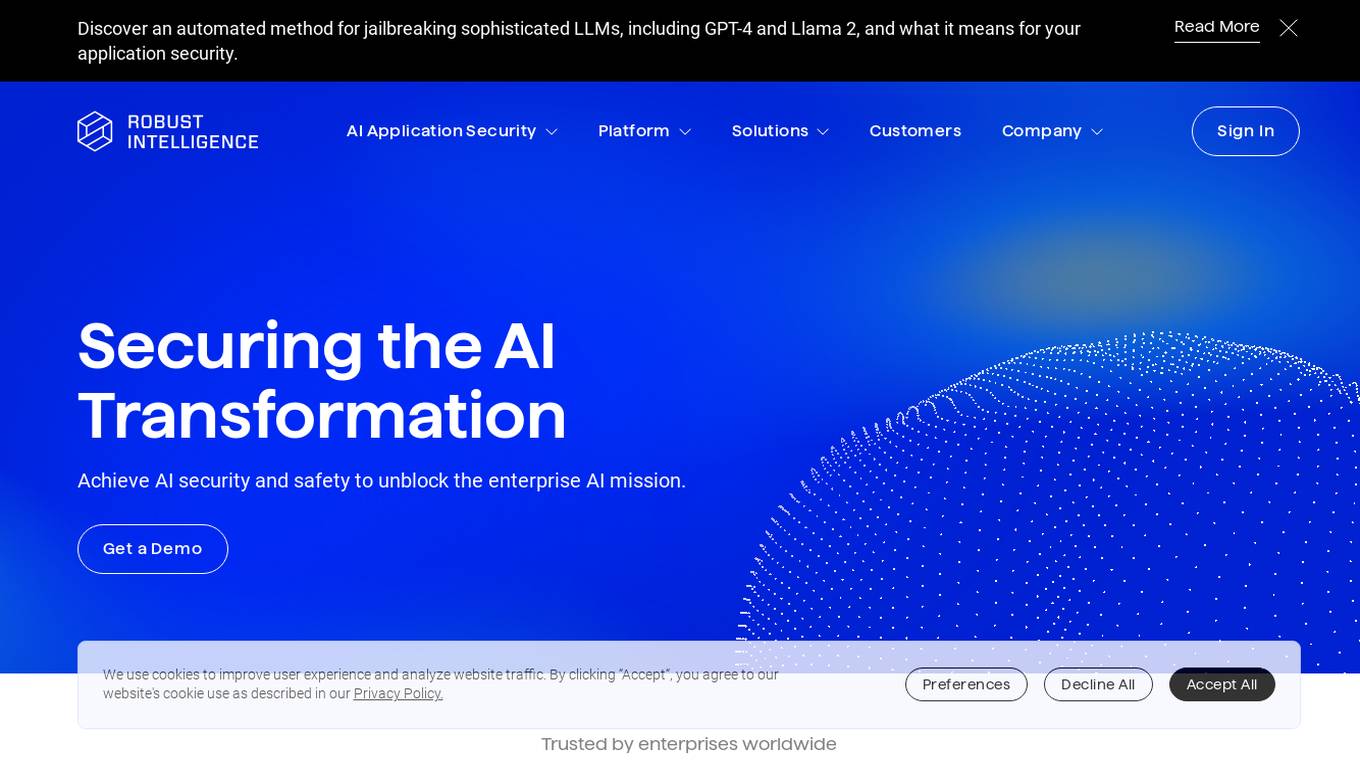
Robust Intelligence
Robust Intelligence is an end-to-end solution for securing AI applications. It automates the evaluation of AI models, data, and files for security and safety vulnerabilities and provides guardrails for AI applications in production against integrity, privacy, abuse, and availability violations. Robust Intelligence helps enterprises remove AI security blockers, save time and resources, meet AI safety and security standards, align AI security across stakeholders, and protect against evolving threats.
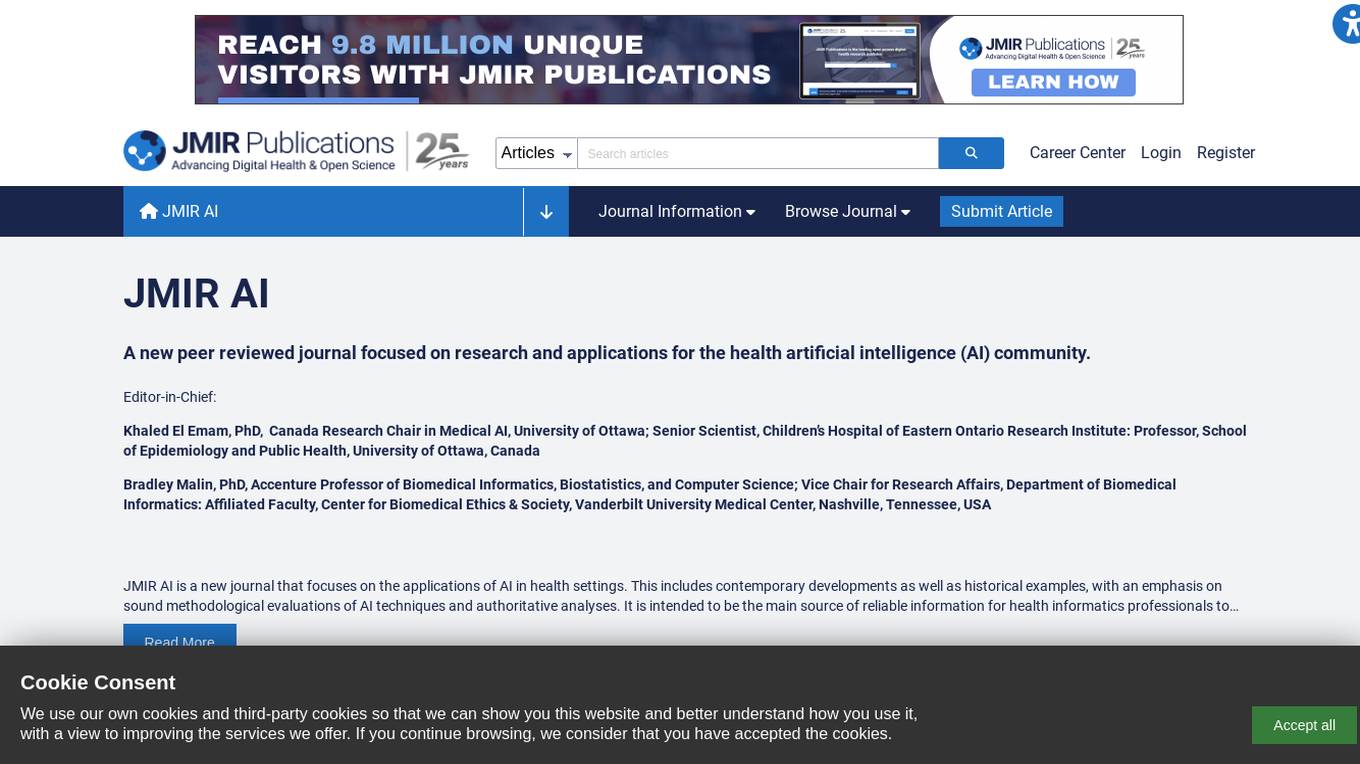
JMIR AI
JMIR AI is a new peer-reviewed journal focused on research and applications for the health artificial intelligence (AI) community. It includes contemporary developments as well as historical examples, with an emphasis on sound methodological evaluations of AI techniques and authoritative analyses. It is intended to be the main source of reliable information for health informatics professionals to learn about how AI techniques can be applied and evaluated.
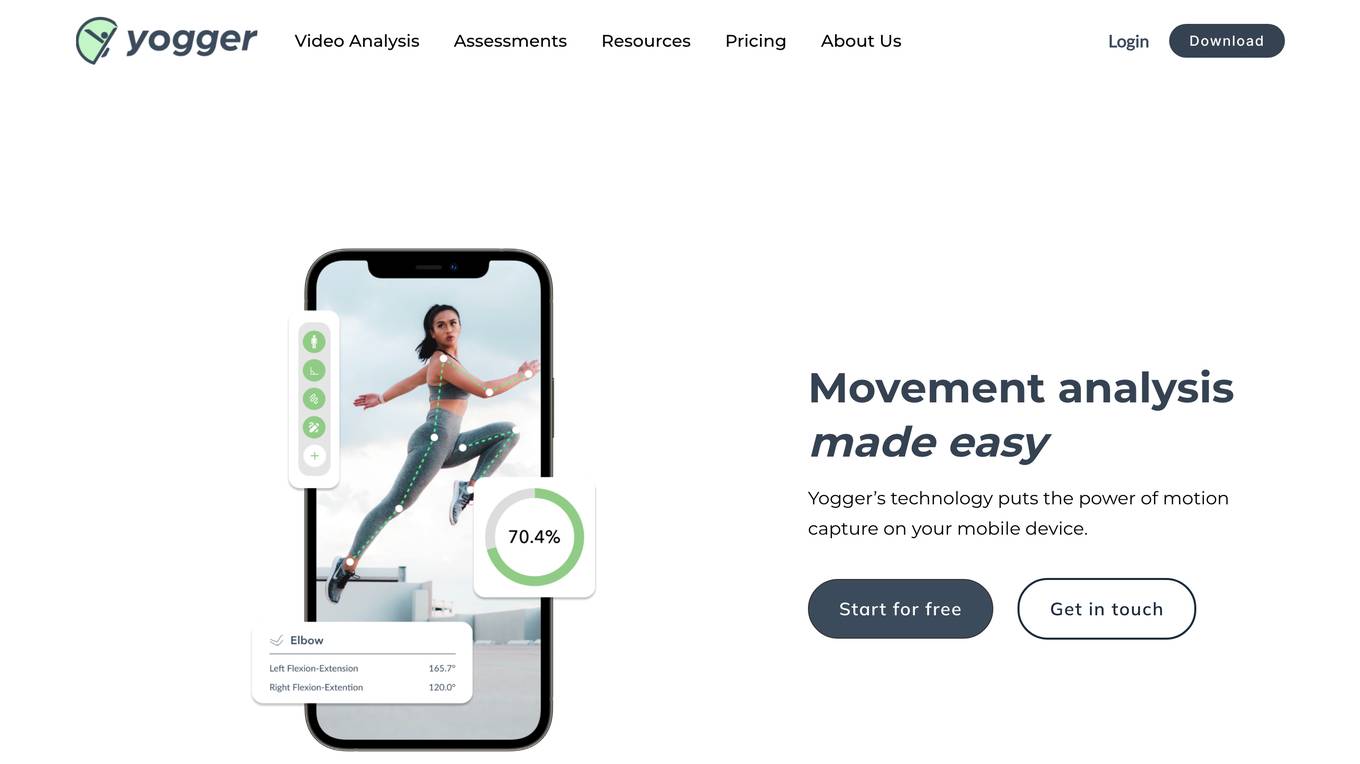
Yogger
Yogger is a video analysis and AI movement assessment tool that empowers coaches, trainers, physical therapists, and athletes to gather precise movement data for performance enhancement, recovery optimization, and injury risk reduction. The software solutions offered by Yogger enable users to analyze movement, critique form, and visualize joint tracking with the help of AI technology. With Yogger, users can streamline client evaluations through automated movement screenings, delivering objective scores and data in just 60 seconds. The tool provides a versatile suite of features for any sport or activity, all accessible from a mobile device.
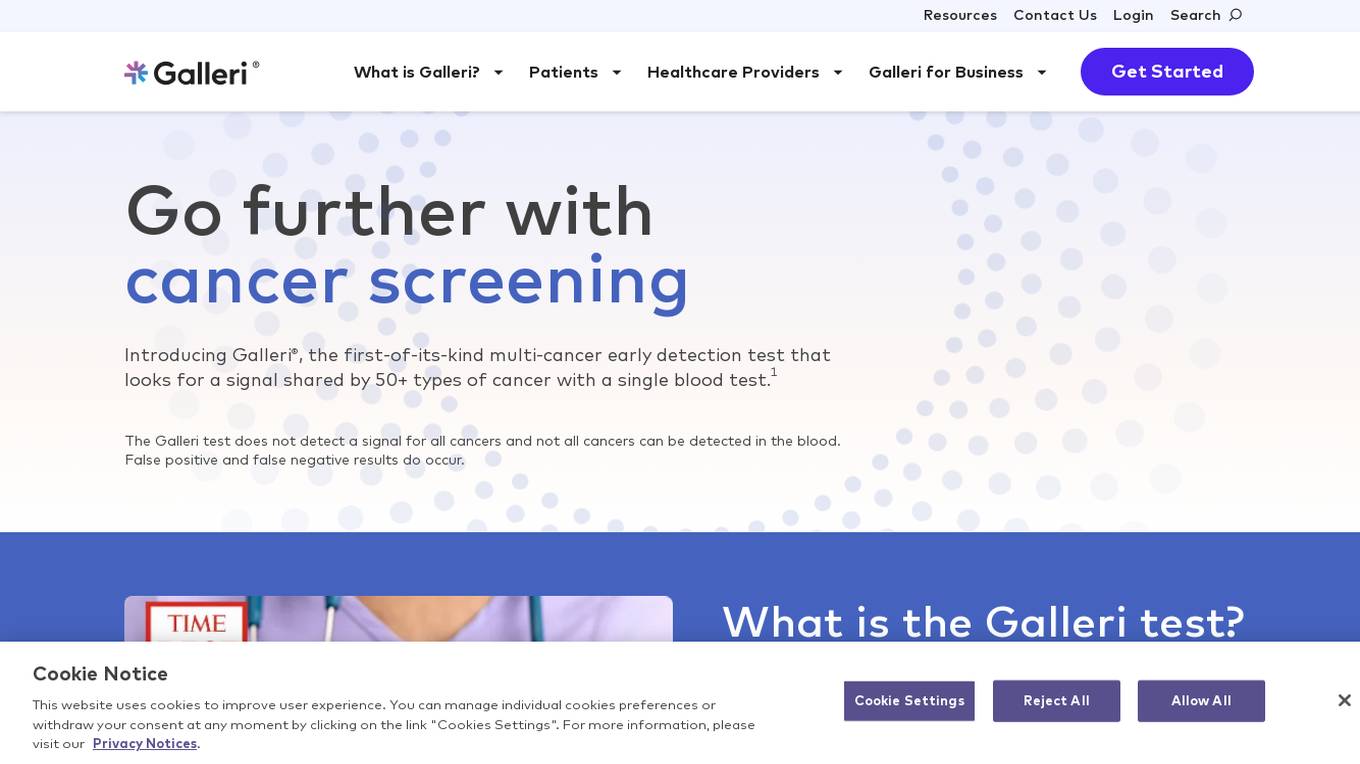
Galleri
Galleri is a multi-cancer early detection test that uses a single blood draw to screen for over 50 types of cancer. It is recommended for adults aged 50 or older who are at an elevated risk for cancer. Galleri is not a diagnostic test and does not detect all cancers. A positive result requires confirmatory diagnostic evaluation by medically established procedures (e.g., imaging) to confirm cancer.

Grow My Small Business - AI
Grow My Small Business - AI is an AI-powered platform that helps small businesses refine their expansion plans, understand market trends, mitigate risks, and develop new offerings. It provides market expansion insights, competitive edge analysis, risk assessment, customized growth strategies, and expert advisors to support business growth. The platform offers idea evaluation packages, personalized growth strategies, and customer support to assist small businesses in scaling effectively and efficiently.
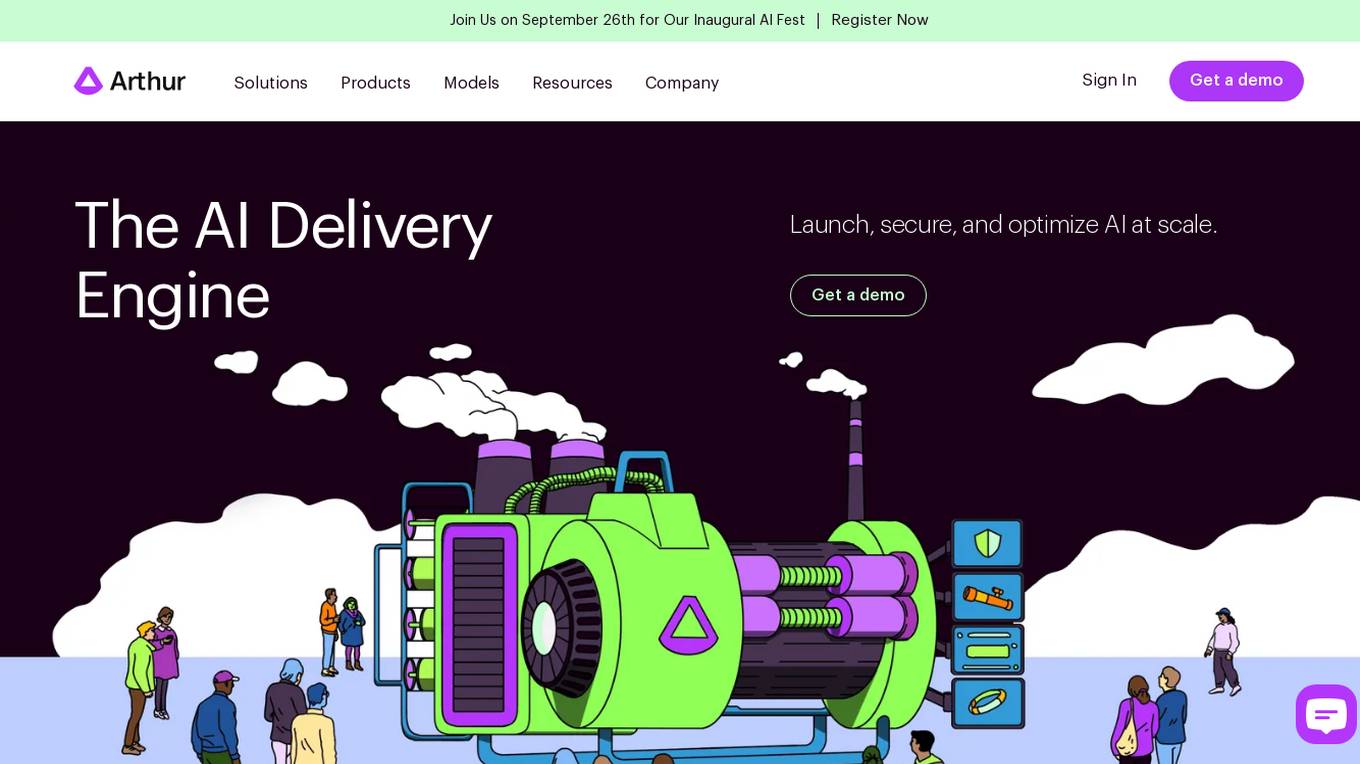
Arthur
Arthur is an industry-leading MLOps platform that simplifies deployment, monitoring, and management of traditional and generative AI models. It ensures scalability, security, compliance, and efficient enterprise use. Arthur's turnkey solutions enable companies to integrate the latest generative AI technologies into their operations, making informed, data-driven decisions. The platform offers open-source evaluation products, model-agnostic monitoring, deployment with leading data science tools, and model risk management capabilities. It emphasizes collaboration, security, and compliance with industry standards.
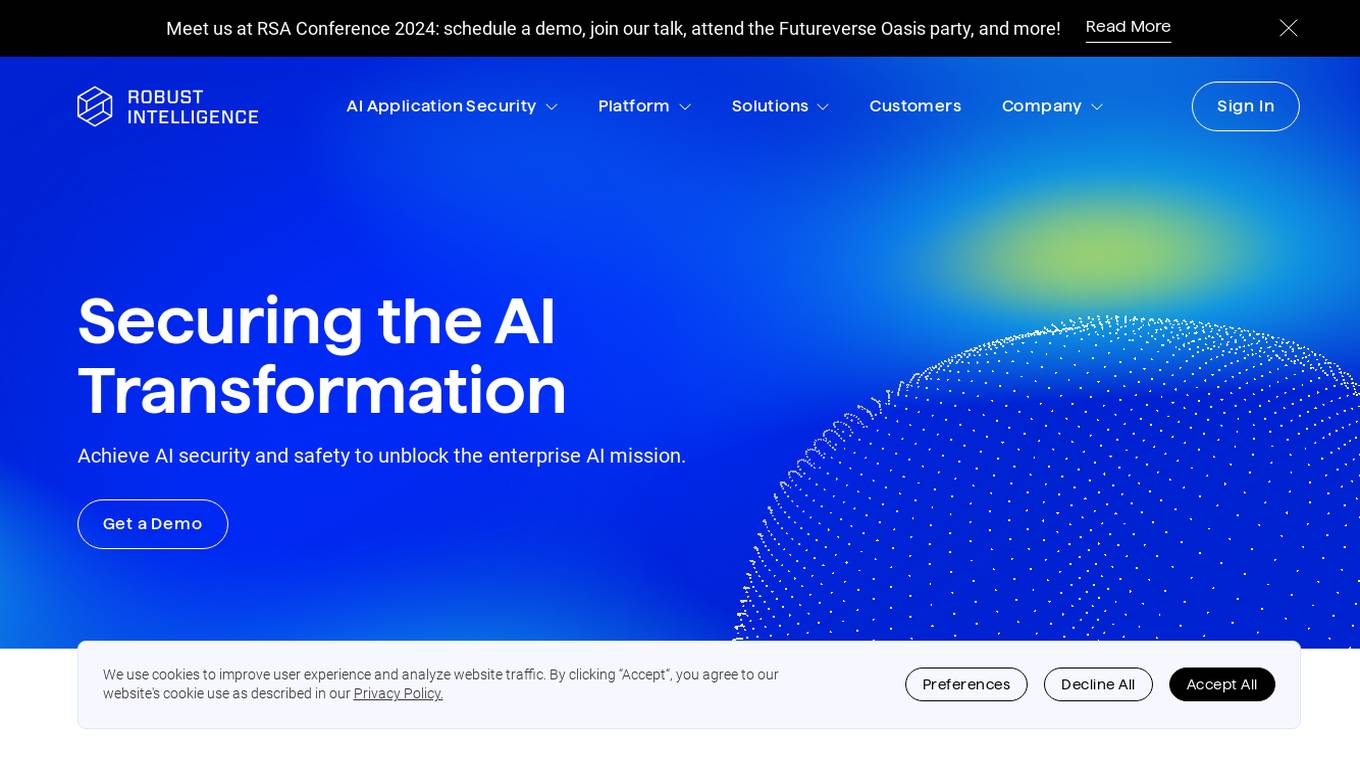
Robust Intelligence
Robust Intelligence is an end-to-end security solution for AI applications. It automates the evaluation of AI models, data, and files for security and safety vulnerabilities and provides guardrails for AI applications in production against integrity, privacy, abuse, and availability violations. Robust Intelligence helps enterprises remove AI security blockers, save time and resources, meet AI safety and security standards, align AI security across stakeholders, and protect against evolving threats.
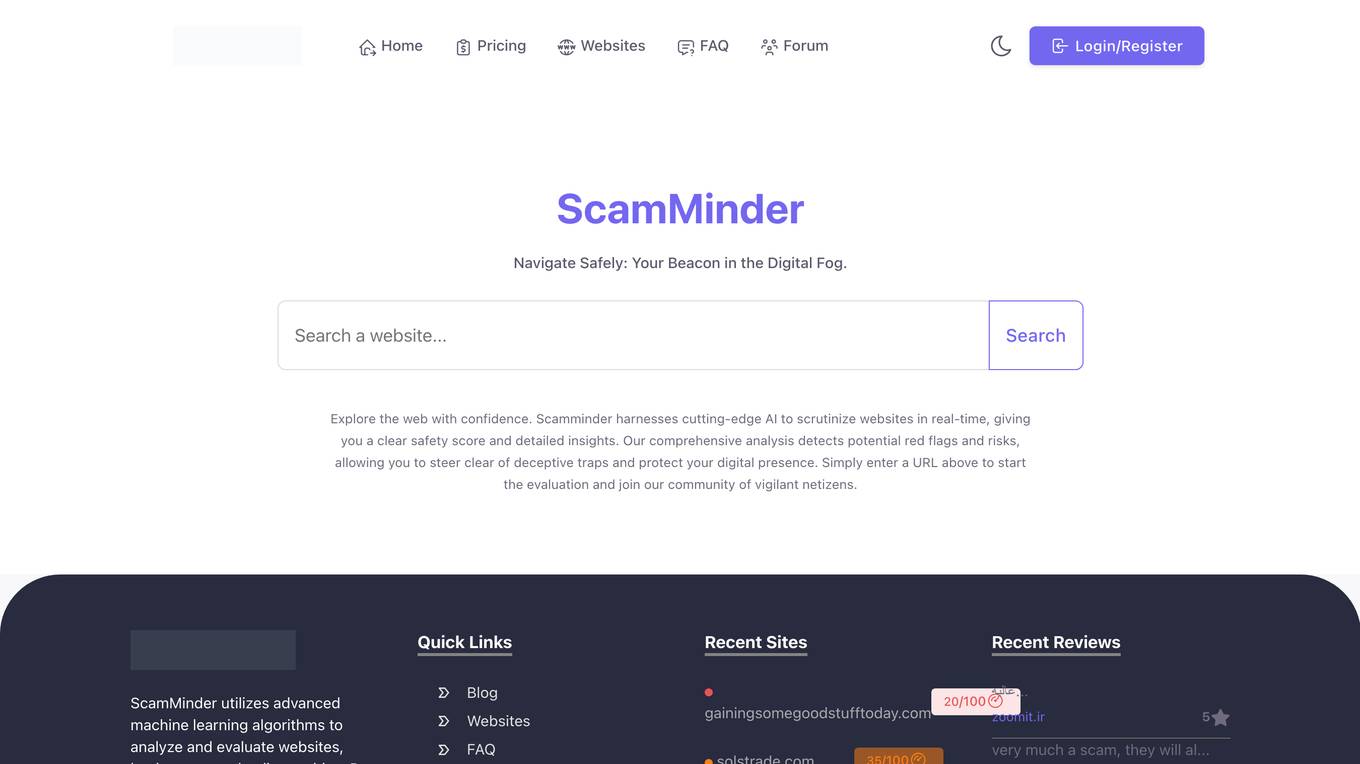
ScamMinder
ScamMinder is an AI-powered tool designed to enhance online safety by analyzing and evaluating websites in real-time. It harnesses cutting-edge AI technology to provide users with a safety score and detailed insights, helping them detect potential risks and red flags. By utilizing advanced machine learning algorithms, ScamMinder assists users in making informed decisions about engaging with websites, businesses, and online entities. With a focus on trustworthiness assessment, the tool aims to protect users from deceptive traps and safeguard their digital presence.
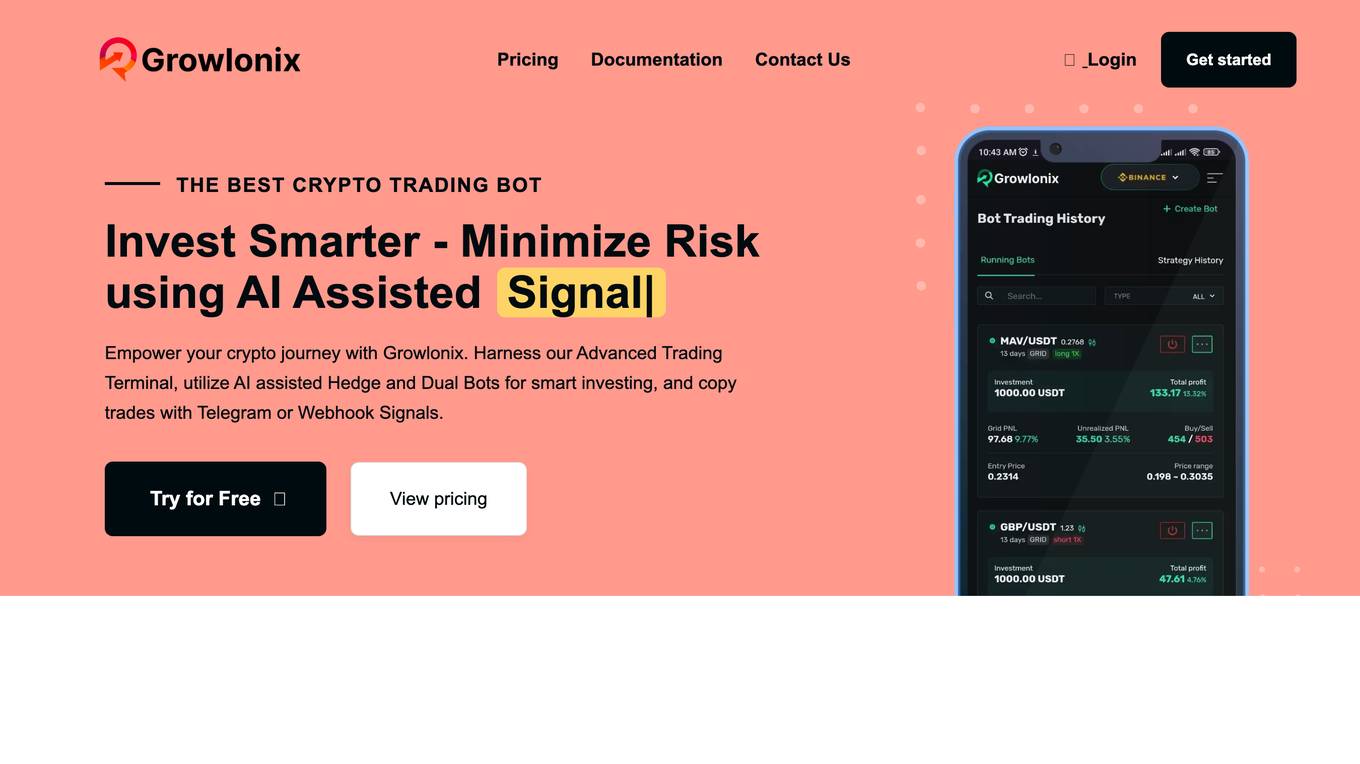
Growlonix
Growlonix is a cutting-edge crypto trading and investment platform designed to optimize and automate your trading experience. From innovative trading bots to dynamic signal automation and automated AI Bots, we cover it all. Our trading bots use advanced algorithms to maximize profits, minimize losses, and bring efficiency to your trading activities. We employ top-notch security measures to ensure that your funds remain secure while utilizing our bots. Whether you're stepping into the world of crypto or have years of trading expertise, Growlonix caters to every stage of your trading evolution.
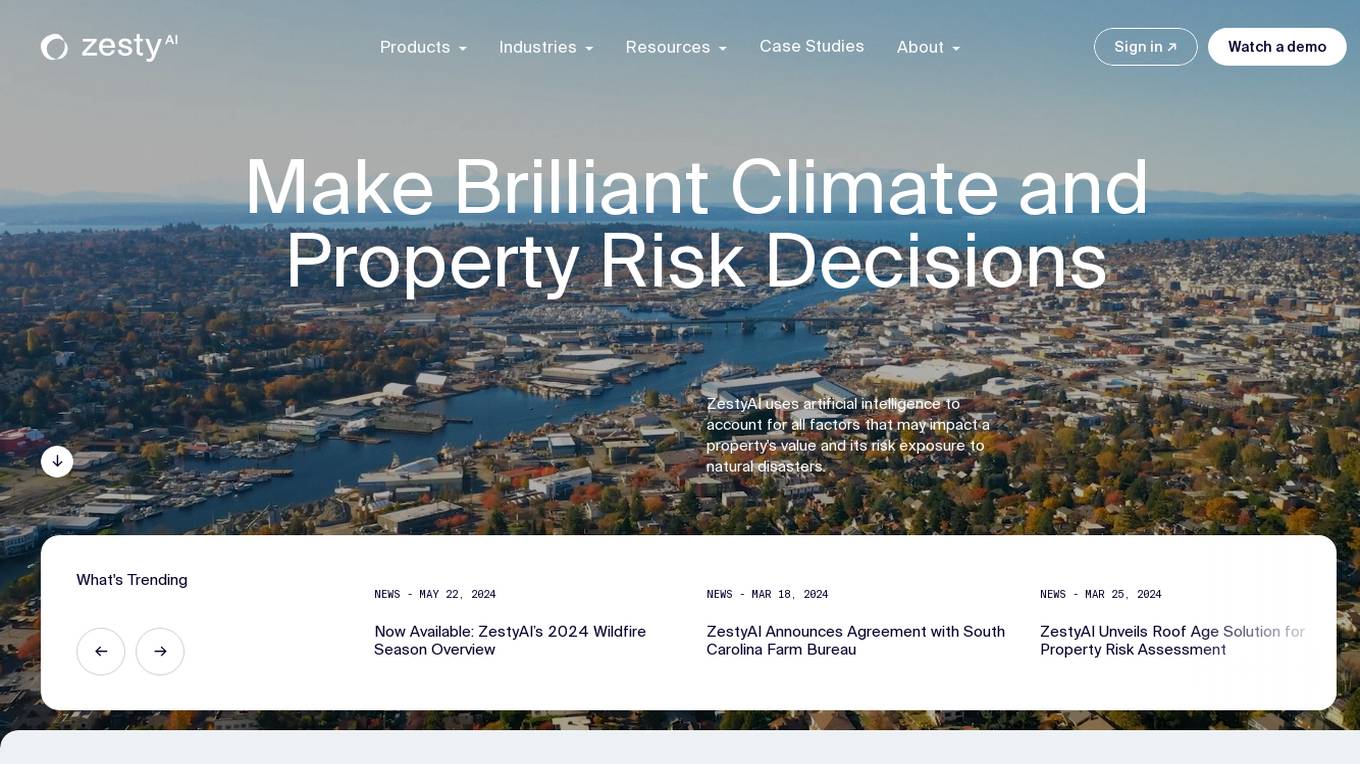
ZestyAI
ZestyAI is an artificial intelligence tool that helps users make brilliant climate and property risk decisions. The tool uses AI to provide insights on property values and risk exposure to natural disasters. It offers products such as Property Insights, Digital Roof, Roof Age, Location Insights, and Climate Risk Models to evaluate and understand property risks. ZestyAI is trusted by top insurers in North America and aims to bring a ten times return on investment to its customers.
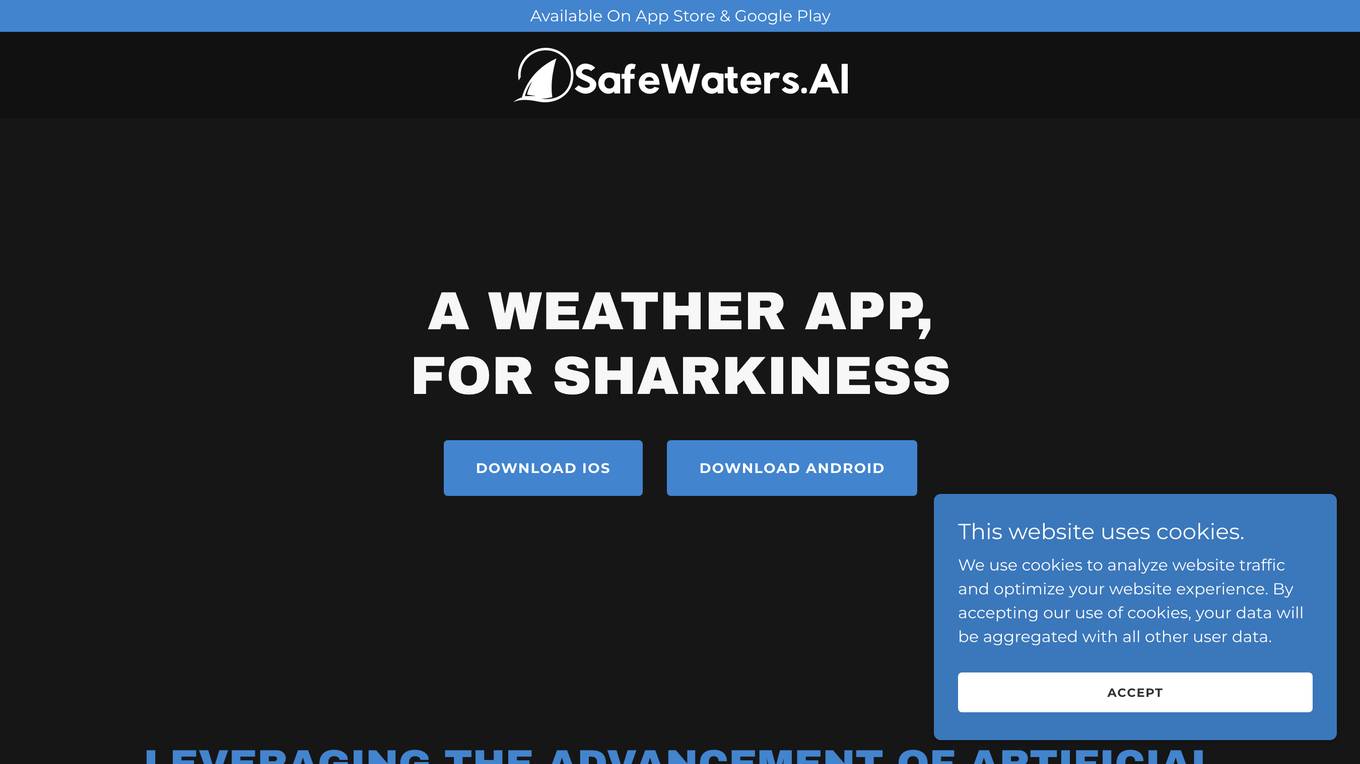
Shark Risk Forecast App
The Shark Risk Forecast App by SafeWaters.ai is an innovative application that provides 7-day shark risk forecasts for beaches worldwide with 83% accuracy. Utilizing predictive AI technology trained on extensive shark attack and marine weather data, the app aims to enhance beach safety by alerting users to potential risks. In addition to current and future risk forecasts, the app offers features like Shark Spotting Drones Live Feed, Chatbot interaction, and Tagged Shark Tracking for a comprehensive beach safety experience.
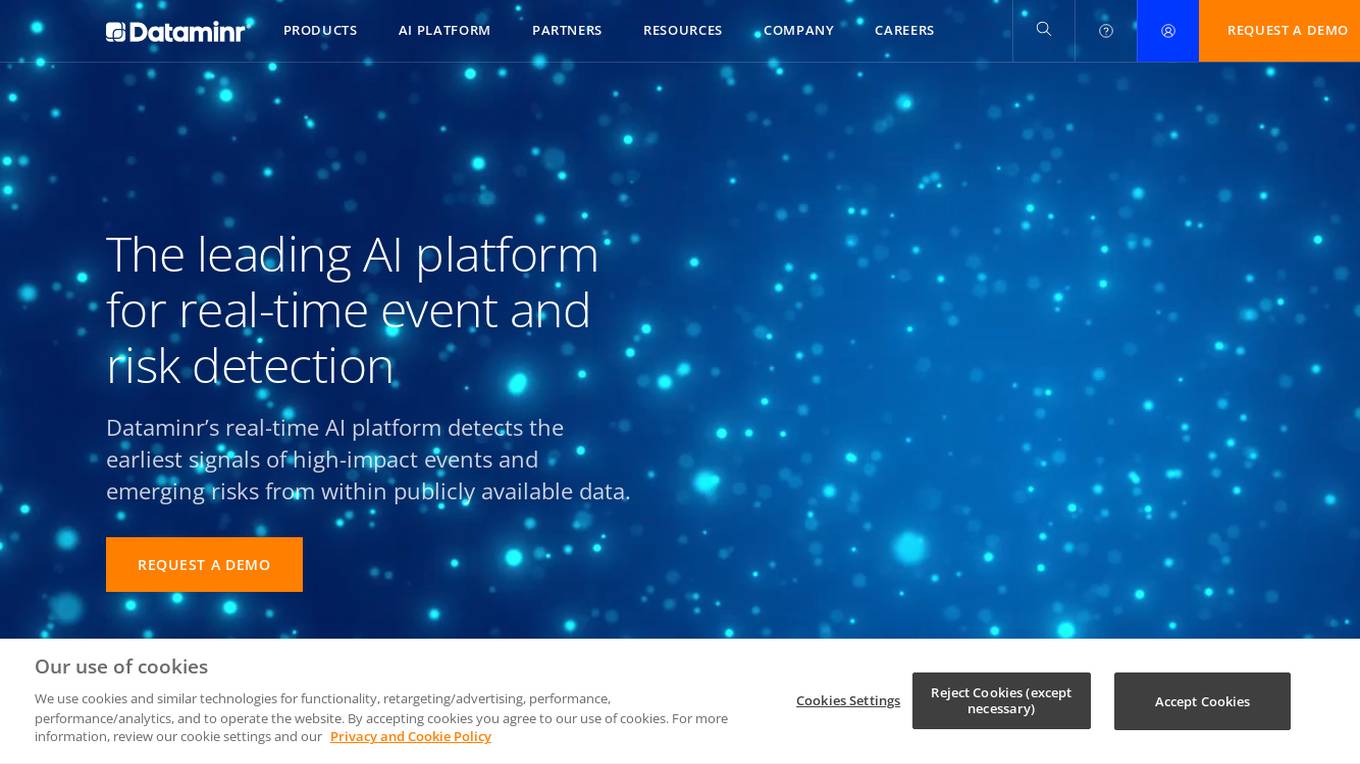
Dataminr
Dataminr is a leading provider of real-time event and risk detection. Its AI platform processes billions of public data units daily to deliver real-time alerts on high-impact events and emerging risks. Dataminr's products are used by businesses, public sector organizations, and newsrooms to plan for and respond to crises, manage risks, and stay informed about the latest events.
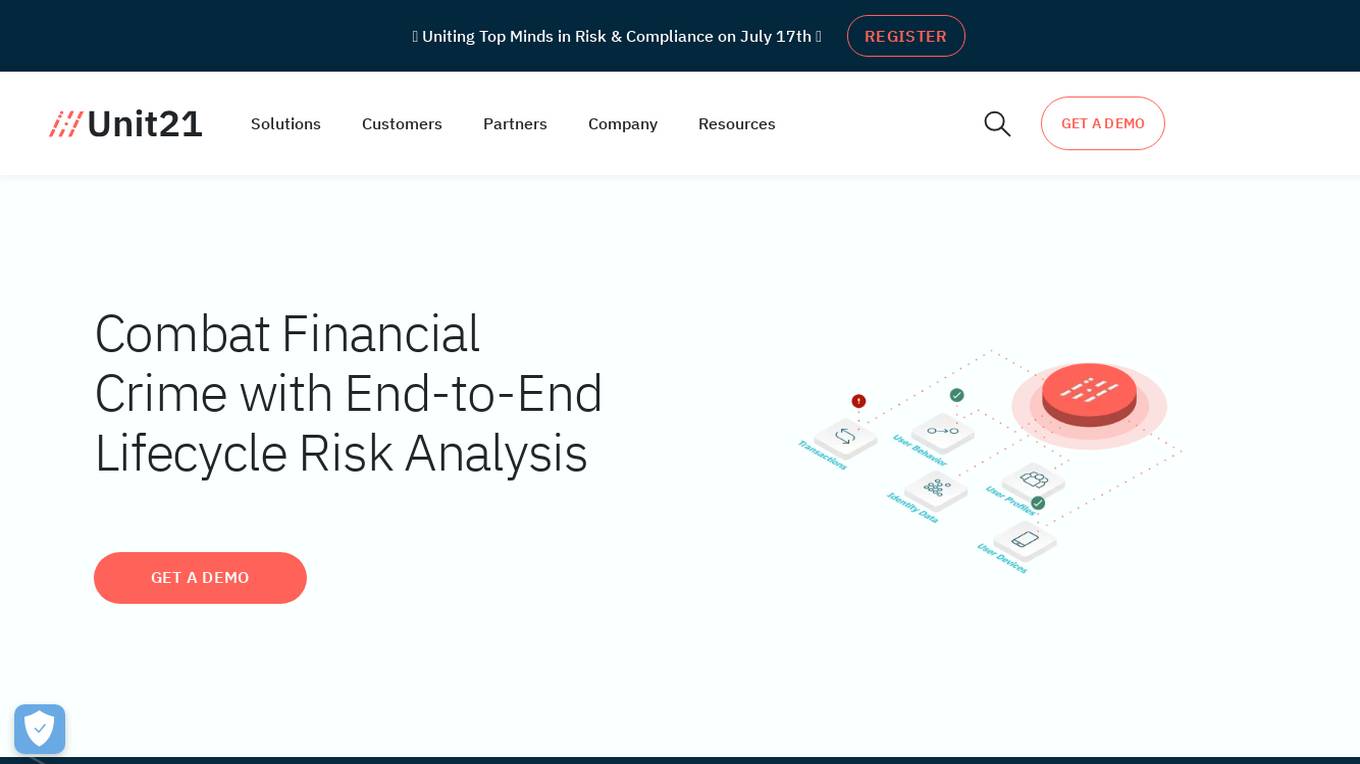
Unit21
Unit21 is a customizable no-code platform designed for risk and compliance operations. It empowers organizations to combat financial crime by providing end-to-end lifecycle risk analysis, fraud prevention, case management, and real-time monitoring solutions. The platform offers features such as AI Copilot for alert prioritization, Ask Your Data for data analysis, Watchlist & Sanctions for ongoing screening, and more. Unit21 focuses on fraud prevention and AML compliance, simplifying operations and accelerating investigations to respond to financial threats effectively and efficiently.
20 - Open Source AI Tools
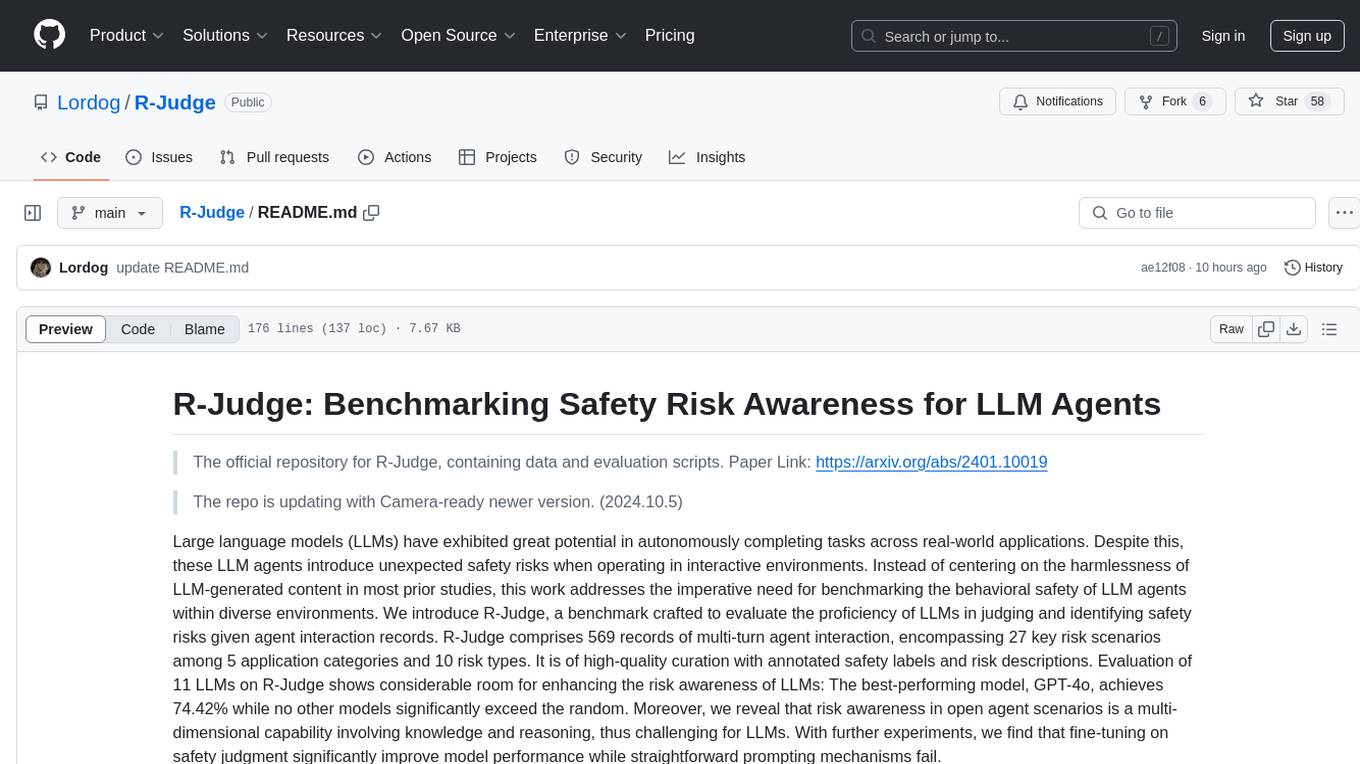
R-Judge
R-Judge is a benchmarking tool designed to evaluate the proficiency of Large Language Models (LLMs) in judging and identifying safety risks within diverse environments. It comprises 569 records of multi-turn agent interactions, covering 27 key risk scenarios across 5 application categories and 10 risk types. The tool provides high-quality curation with annotated safety labels and risk descriptions. Evaluation of 11 LLMs on R-Judge reveals the need for enhancing risk awareness in LLMs, especially in open agent scenarios. Fine-tuning on safety judgment is found to significantly improve model performance.
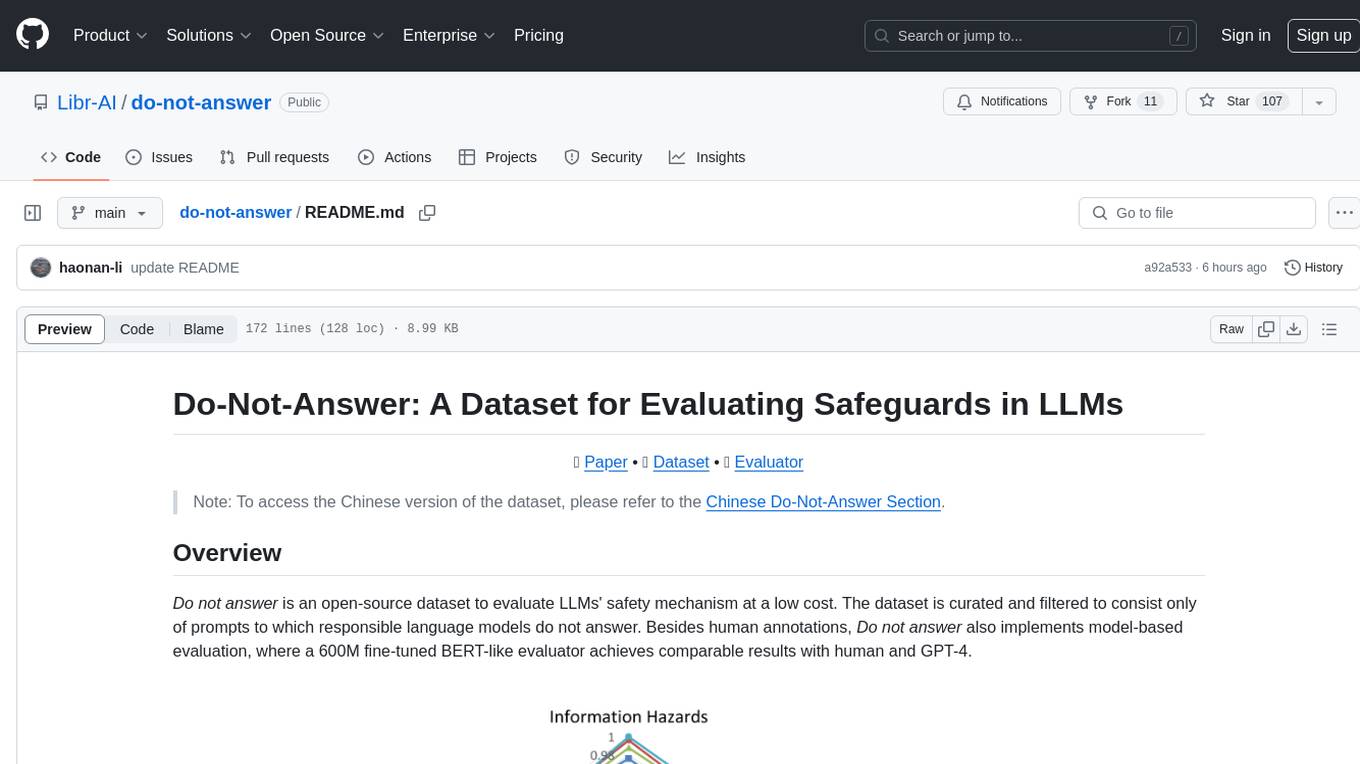
do-not-answer
Do-Not-Answer is an open-source dataset curated to evaluate Large Language Models' safety mechanisms at a low cost. It consists of prompts to which responsible language models do not answer. The dataset includes human annotations and model-based evaluation using a fine-tuned BERT-like evaluator. The dataset covers 61 specific harms and collects 939 instructions across five risk areas and 12 harm types. Response assessment is done for six models, categorizing responses into harmfulness and action categories. Both human and automatic evaluations show the safety of models across different risk areas. The dataset also includes a Chinese version with 1,014 questions for evaluating Chinese LLMs' risk perception and sensitivity to specific words and phrases.
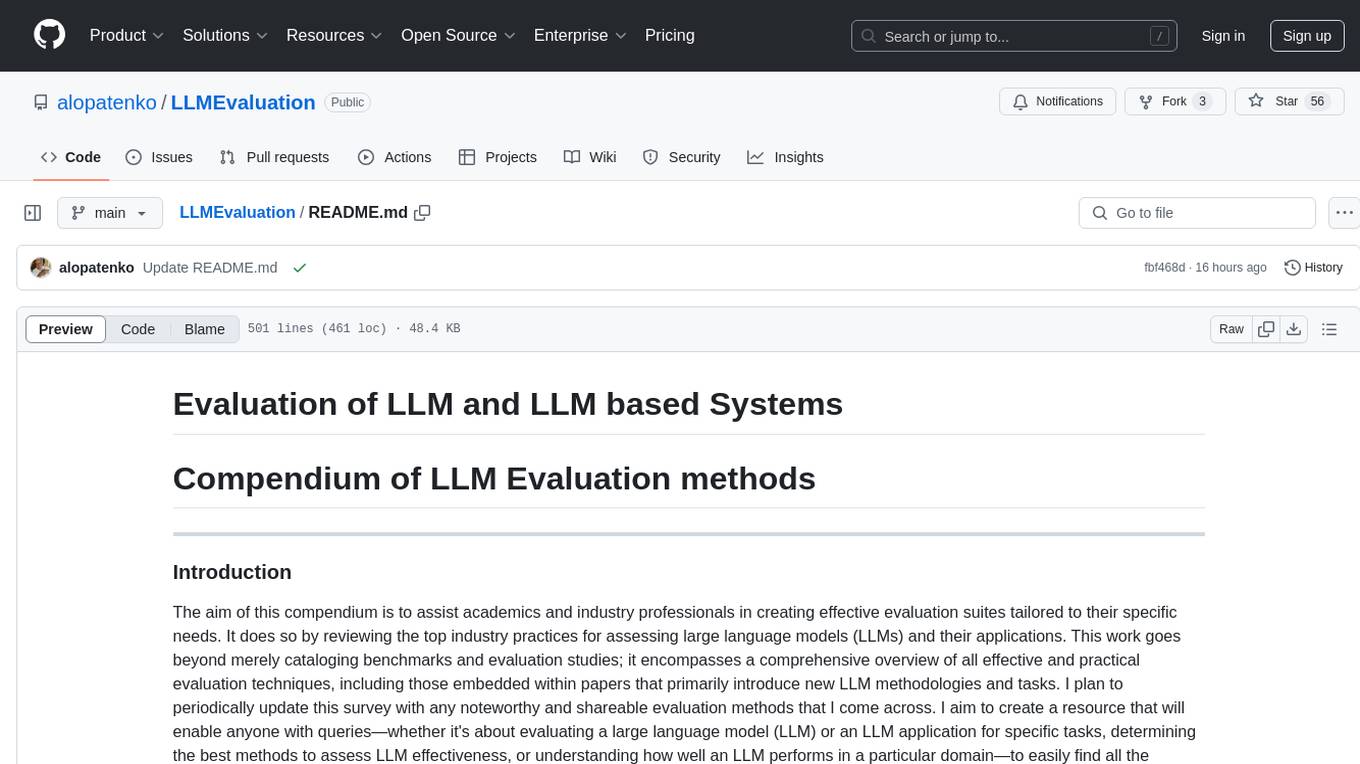
LLMEvaluation
The LLMEvaluation repository is a comprehensive compendium of evaluation methods for Large Language Models (LLMs) and LLM-based systems. It aims to assist academics and industry professionals in creating effective evaluation suites tailored to their specific needs by reviewing industry practices for assessing LLMs and their applications. The repository covers a wide range of evaluation techniques, benchmarks, and studies related to LLMs, including areas such as embeddings, question answering, multi-turn dialogues, reasoning, multi-lingual tasks, ethical AI, biases, safe AI, code generation, summarization, software performance, agent LLM architectures, long text generation, graph understanding, and various unclassified tasks. It also includes evaluations for LLM systems in conversational systems, copilots, search and recommendation engines, task utility, and verticals like healthcare, law, science, financial, and others. The repository provides a wealth of resources for evaluating and understanding the capabilities of LLMs in different domains.
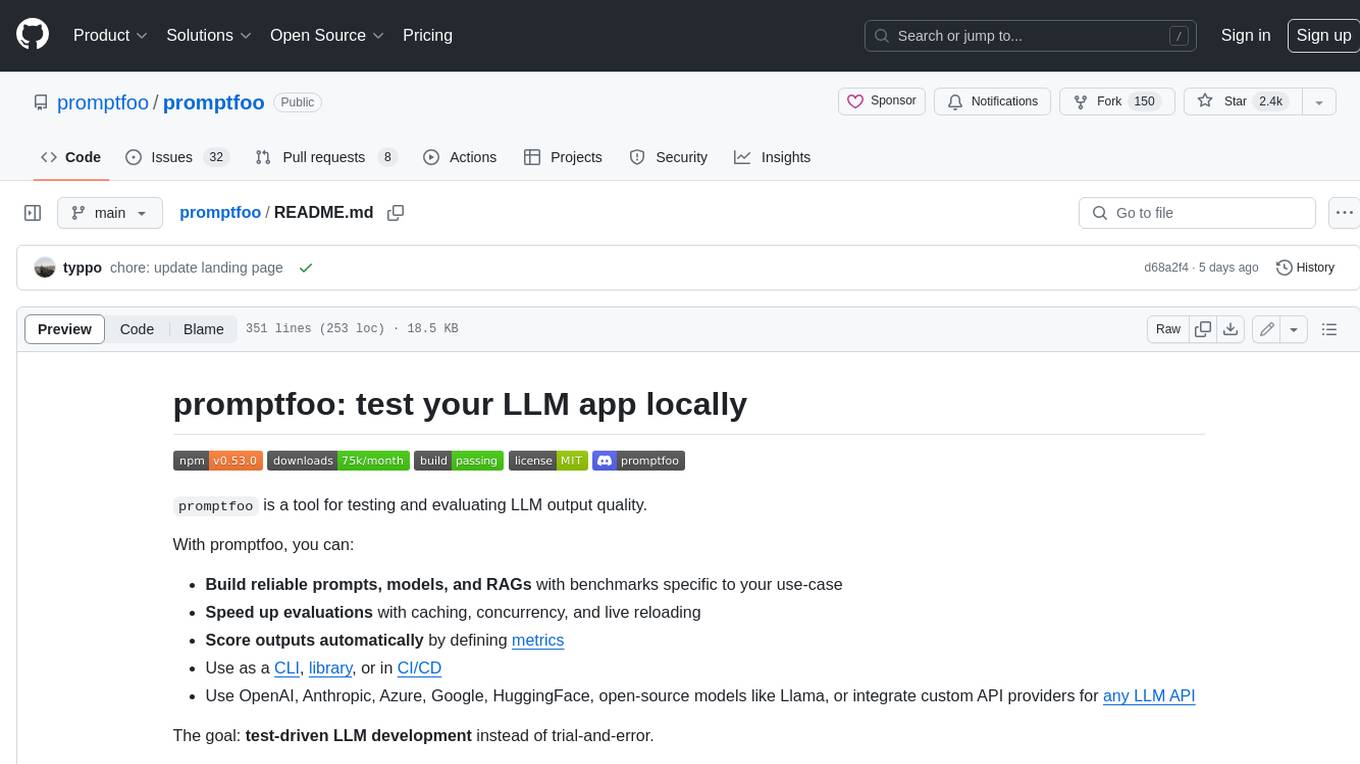
promptfoo
Promptfoo is a tool for testing and evaluating LLM output quality. With promptfoo, you can build reliable prompts, models, and RAGs with benchmarks specific to your use-case, speed up evaluations with caching, concurrency, and live reloading, score outputs automatically by defining metrics, use as a CLI, library, or in CI/CD, and use OpenAI, Anthropic, Azure, Google, HuggingFace, open-source models like Llama, or integrate custom API providers for any LLM API.
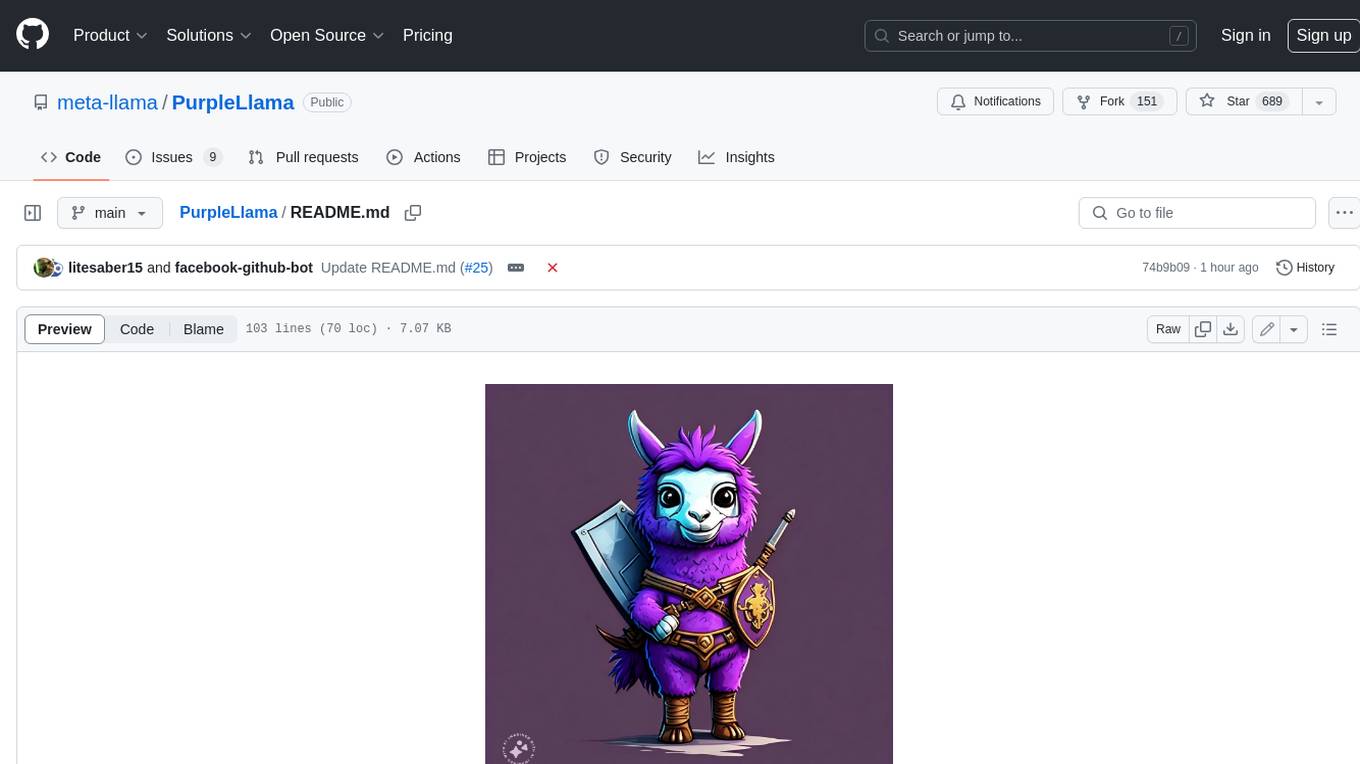
PurpleLlama
Purple Llama is an umbrella project that aims to provide tools and evaluations to support responsible development and usage of generative AI models. It encompasses components for cybersecurity and input/output safeguards, with plans to expand in the future. The project emphasizes a collaborative approach, borrowing the concept of purple teaming from cybersecurity, to address potential risks and challenges posed by generative AI. Components within Purple Llama are licensed permissively to foster community collaboration and standardize the development of trust and safety tools for generative AI.
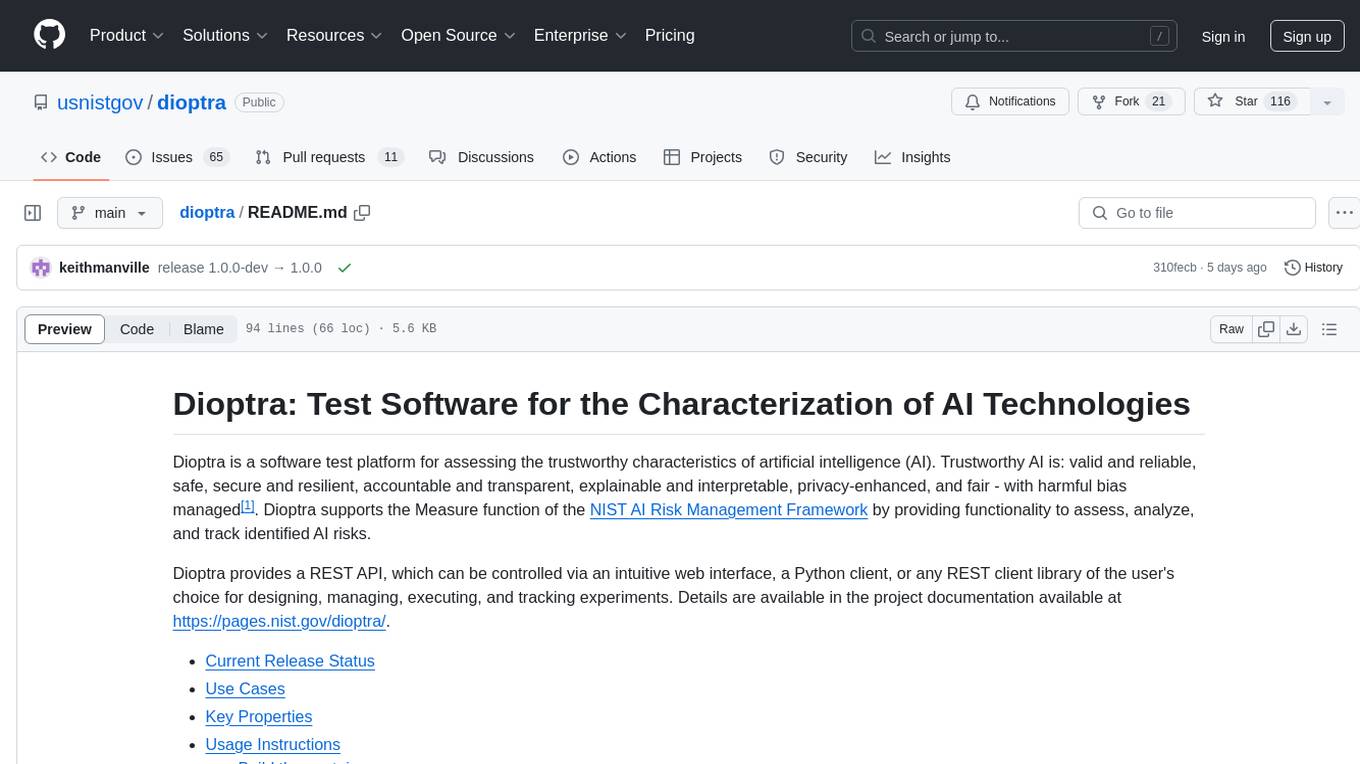
dioptra
Dioptra is a software test platform for assessing the trustworthy characteristics of artificial intelligence (AI). It supports the NIST AI Risk Management Framework by providing functionality to assess, analyze, and track identified AI risks. Dioptra provides a REST API and can be controlled via a web interface or Python client for designing, managing, executing, and tracking experiments. It aims to be reproducible, traceable, extensible, interoperable, modular, secure, interactive, shareable, and reusable.

PIXIU
PIXIU is a project designed to support the development, fine-tuning, and evaluation of Large Language Models (LLMs) in the financial domain. It includes components like FinBen, a Financial Language Understanding and Prediction Evaluation Benchmark, FIT, a Financial Instruction Dataset, and FinMA, a Financial Large Language Model. The project provides open resources, multi-task and multi-modal financial data, and diverse financial tasks for training and evaluation. It aims to encourage open research and transparency in the financial NLP field.
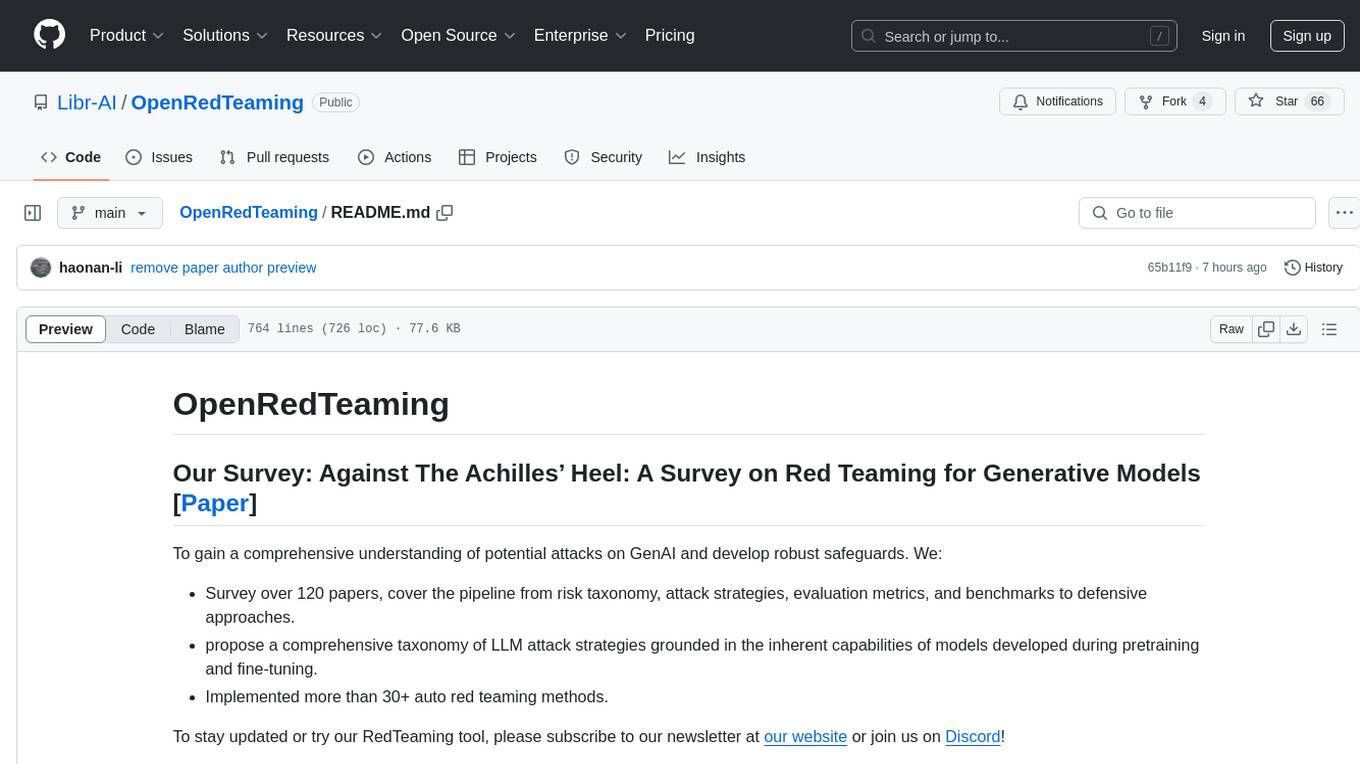
OpenRedTeaming
OpenRedTeaming is a repository focused on red teaming for generative models, specifically large language models (LLMs). The repository provides a comprehensive survey on potential attacks on GenAI and robust safeguards. It covers attack strategies, evaluation metrics, benchmarks, and defensive approaches. The repository also implements over 30 auto red teaming methods. It includes surveys, taxonomies, attack strategies, and risks related to LLMs. The goal is to understand vulnerabilities and develop defenses against adversarial attacks on large language models.
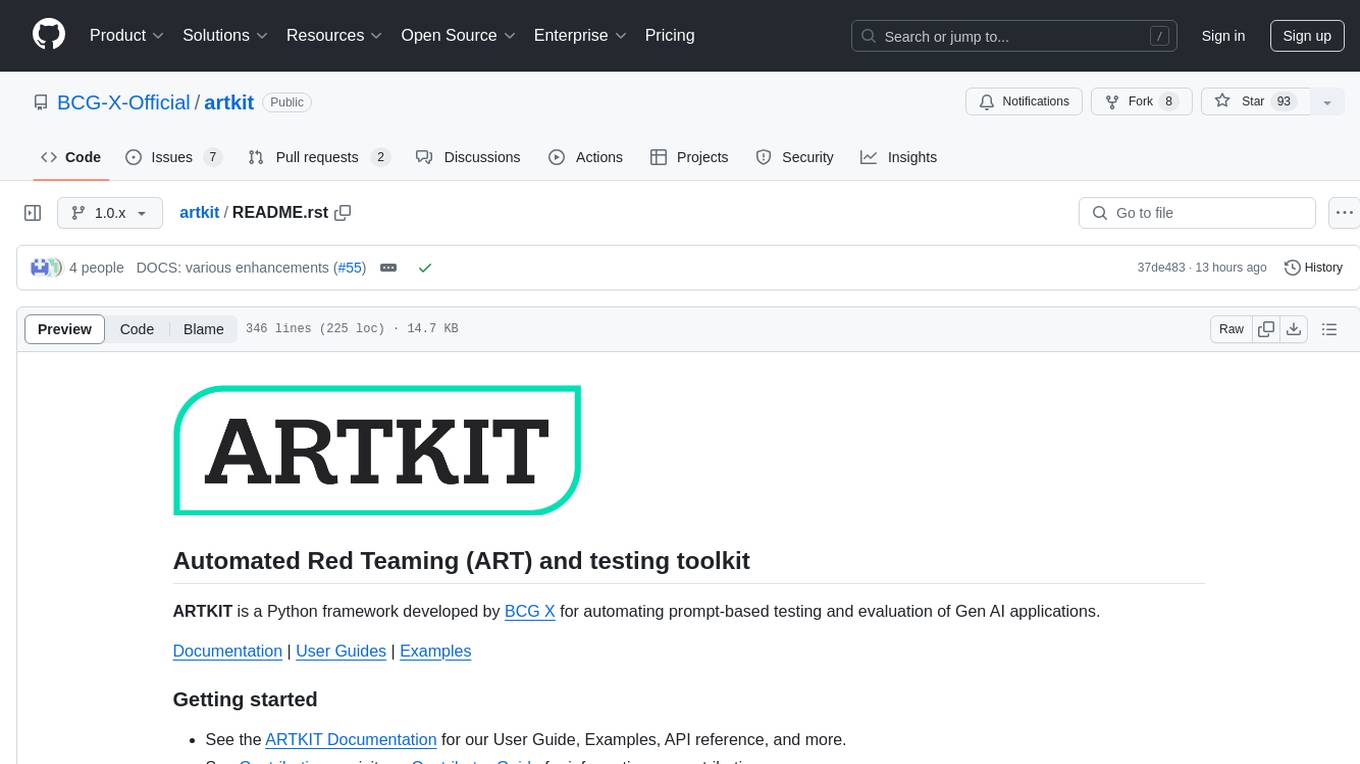
artkit
ARTKIT is a Python framework developed by BCG X for automating prompt-based testing and evaluation of Gen AI applications. It allows users to develop automated end-to-end testing and evaluation pipelines for Gen AI systems, supporting multi-turn conversations and various testing scenarios like Q&A accuracy, brand values, equitability, safety, and security. The framework provides a simple API, asynchronous processing, caching, model agnostic support, end-to-end pipelines, multi-turn conversations, robust data flows, and visualizations. ARTKIT is designed for customization by data scientists and engineers to enhance human-in-the-loop testing and evaluation, emphasizing the importance of tailored testing for each Gen AI use case.
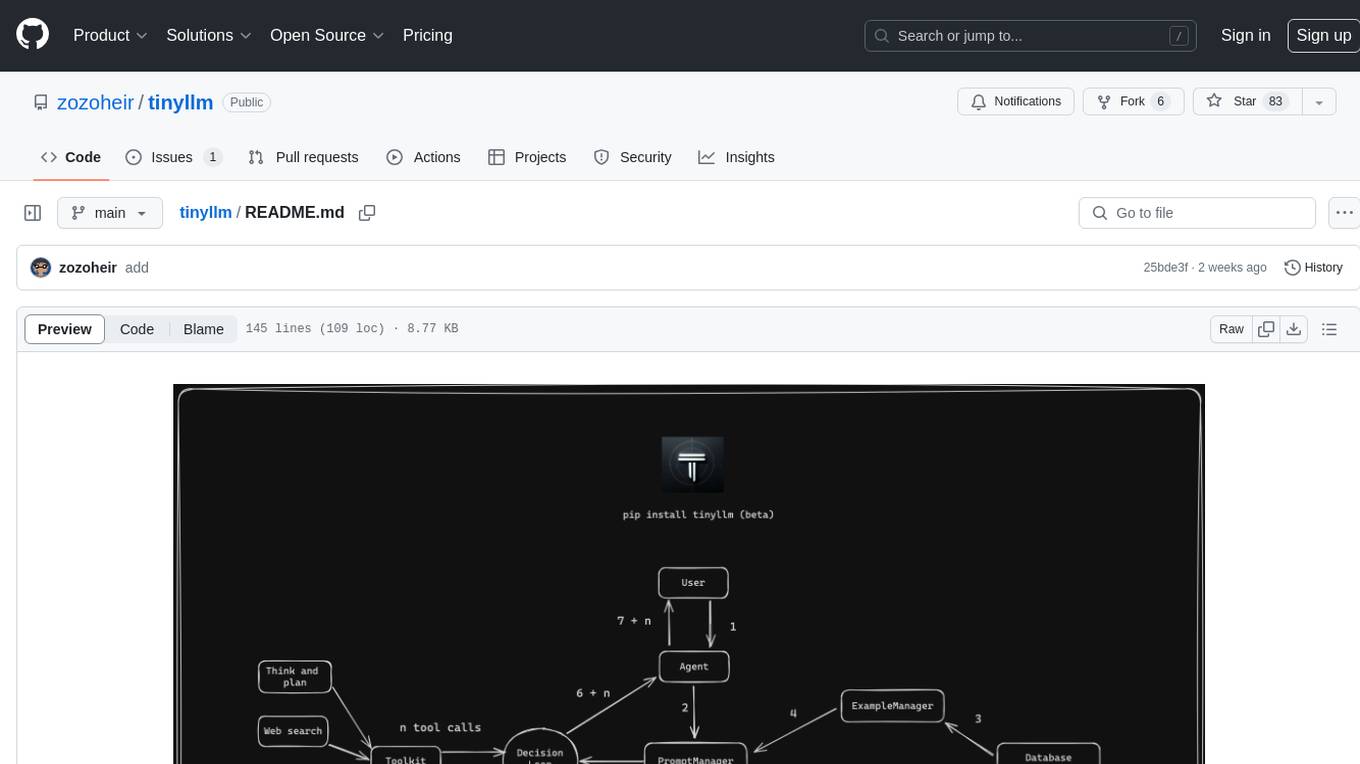
tinyllm
tinyllm is a lightweight framework designed for developing, debugging, and monitoring LLM and Agent powered applications at scale. It aims to simplify code while enabling users to create complex agents or LLM workflows in production. The core classes, Function and FunctionStream, standardize and control LLM, ToolStore, and relevant calls for scalable production use. It offers structured handling of function execution, including input/output validation, error handling, evaluation, and more, all while maintaining code readability. Users can create chains with prompts, LLM models, and evaluators in a single file without the need for extensive class definitions or spaghetti code. Additionally, tinyllm integrates with various libraries like Langfuse and provides tools for prompt engineering, observability, logging, and finite state machine design.
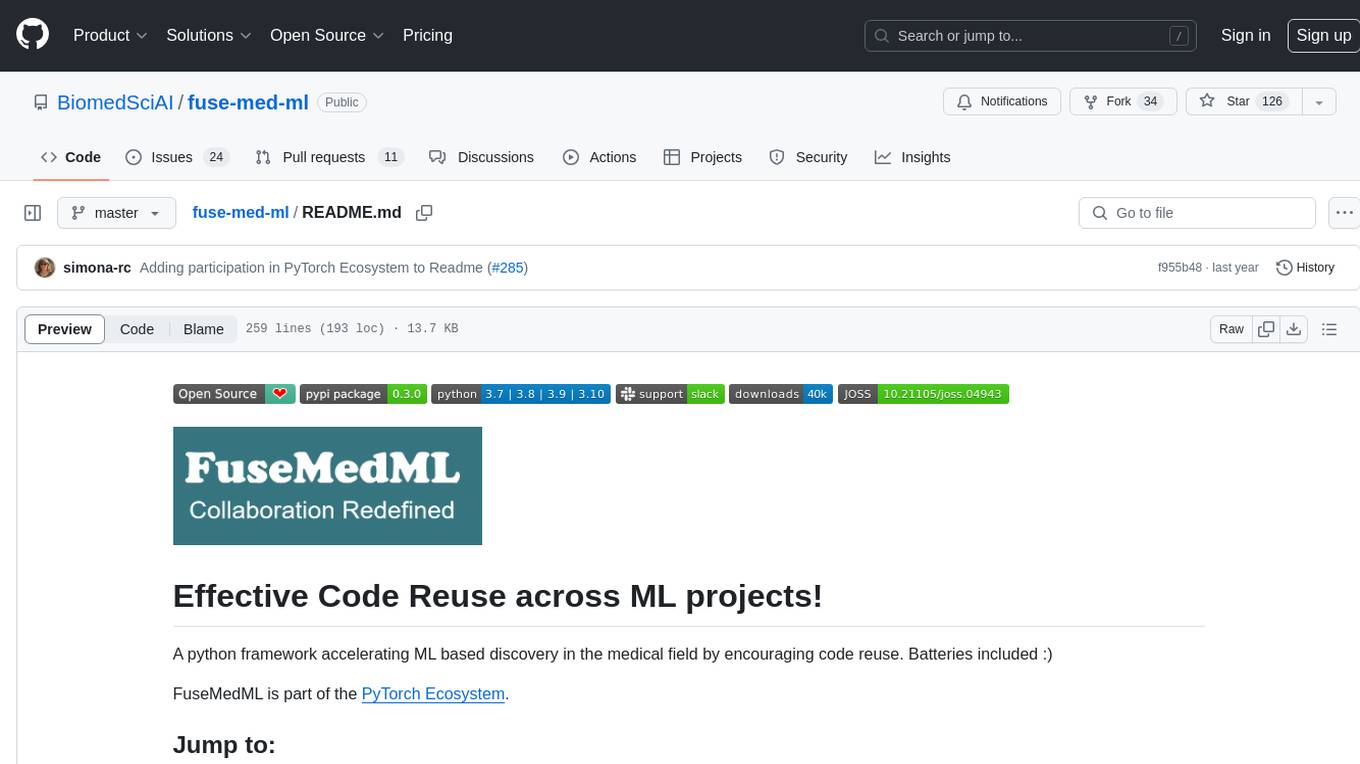
fuse-med-ml
FuseMedML is a Python framework designed to accelerate machine learning-based discovery in the medical field by promoting code reuse. It provides a flexible design concept where data is stored in a nested dictionary, allowing easy handling of multi-modality information. The framework includes components for creating custom models, loss functions, metrics, and data processing operators. Additionally, FuseMedML offers 'batteries included' key components such as fuse.data for data processing, fuse.eval for model evaluation, and fuse.dl for reusable deep learning components. It supports PyTorch and PyTorch Lightning libraries and encourages the creation of domain extensions for specific medical domains.
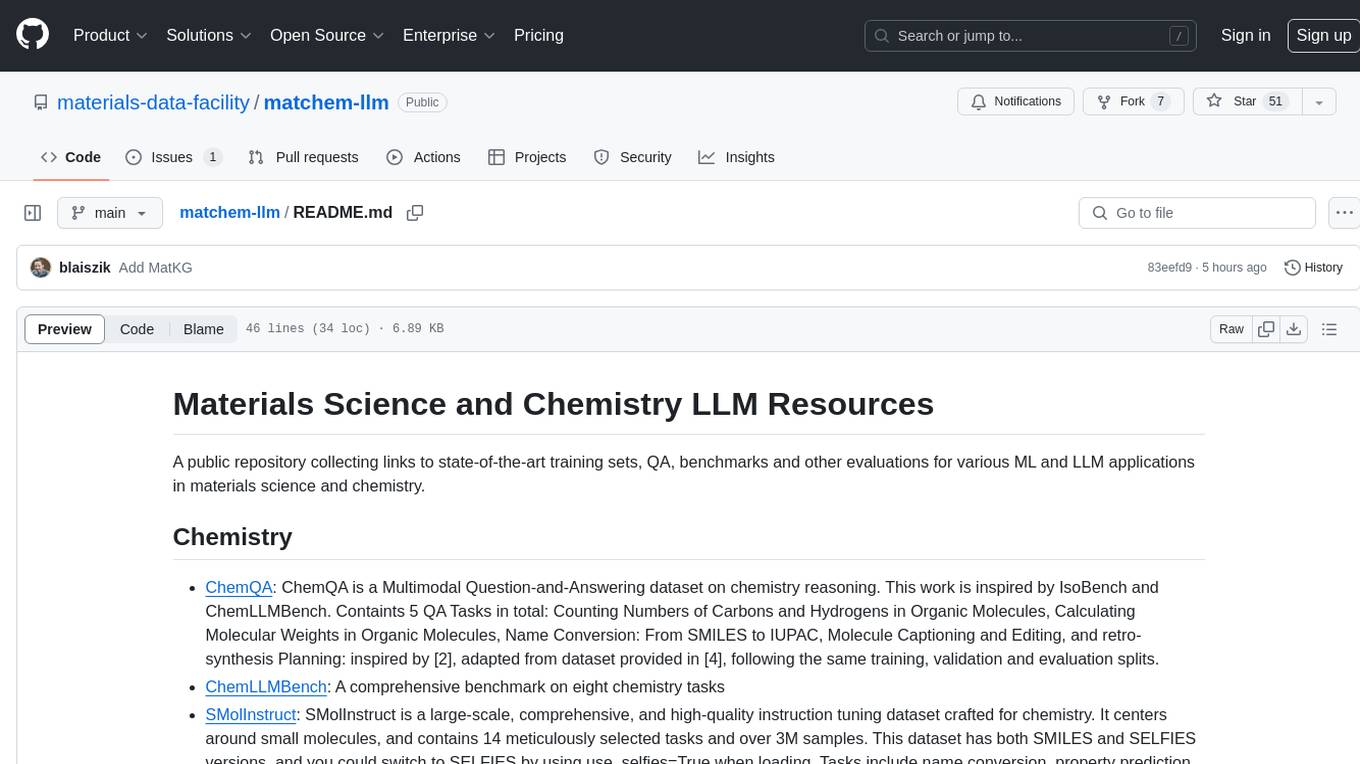
matchem-llm
A public repository collecting links to state-of-the-art training sets, QA, benchmarks and other evaluations for various ML and LLM applications in materials science and chemistry. It includes datasets related to chemistry, materials, multimodal data, and knowledge graphs in the field. The repository aims to provide resources for training and evaluating machine learning models in the materials science and chemistry domains.
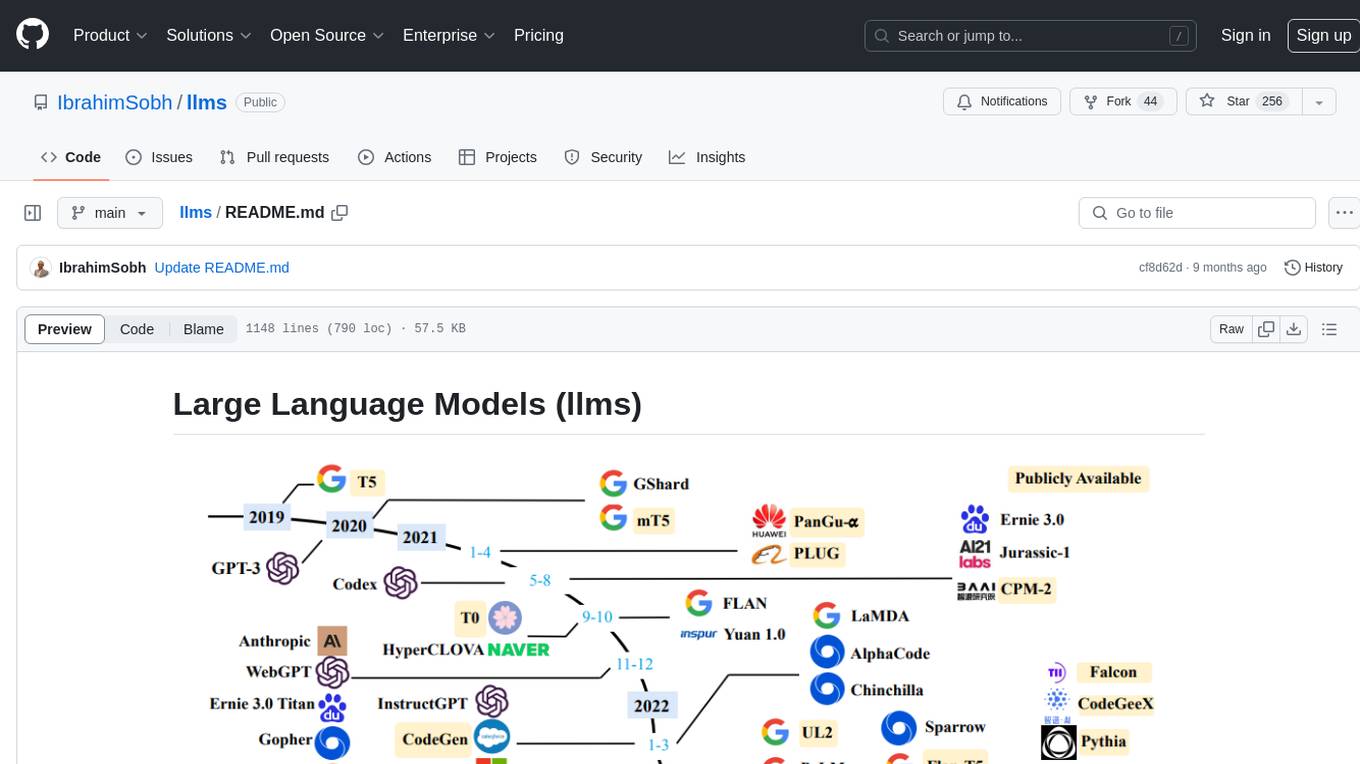
llms
The 'llms' repository is a comprehensive guide on Large Language Models (LLMs), covering topics such as language modeling, applications of LLMs, statistical language modeling, neural language models, conditional language models, evaluation methods, transformer-based language models, practical LLMs like GPT and BERT, prompt engineering, fine-tuning LLMs, retrieval augmented generation, AI agents, and LLMs for computer vision. The repository provides detailed explanations, examples, and tools for working with LLMs.

LLM-PowerHouse-A-Curated-Guide-for-Large-Language-Models-with-Custom-Training-and-Inferencing
LLM-PowerHouse is a comprehensive and curated guide designed to empower developers, researchers, and enthusiasts to harness the true capabilities of Large Language Models (LLMs) and build intelligent applications that push the boundaries of natural language understanding. This GitHub repository provides in-depth articles, codebase mastery, LLM PlayLab, and resources for cost analysis and network visualization. It covers various aspects of LLMs, including NLP, models, training, evaluation metrics, open LLMs, and more. The repository also includes a collection of code examples and tutorials to help users build and deploy LLM-based applications.
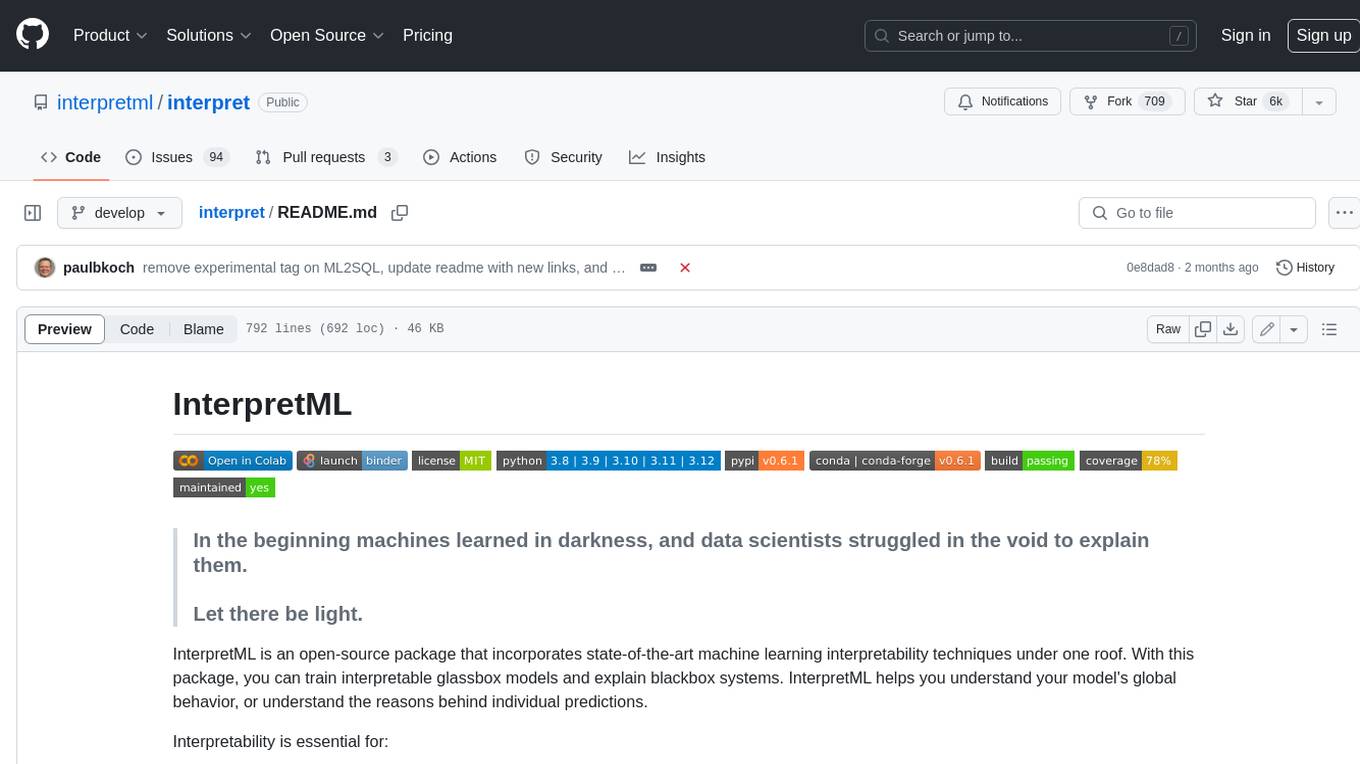
interpret
InterpretML is an open-source package that incorporates state-of-the-art machine learning interpretability techniques under one roof. With this package, you can train interpretable glassbox models and explain blackbox systems. InterpretML helps you understand your model's global behavior, or understand the reasons behind individual predictions. Interpretability is essential for: - Model debugging - Why did my model make this mistake? - Feature Engineering - How can I improve my model? - Detecting fairness issues - Does my model discriminate? - Human-AI cooperation - How can I understand and trust the model's decisions? - Regulatory compliance - Does my model satisfy legal requirements? - High-risk applications - Healthcare, finance, judicial, ...
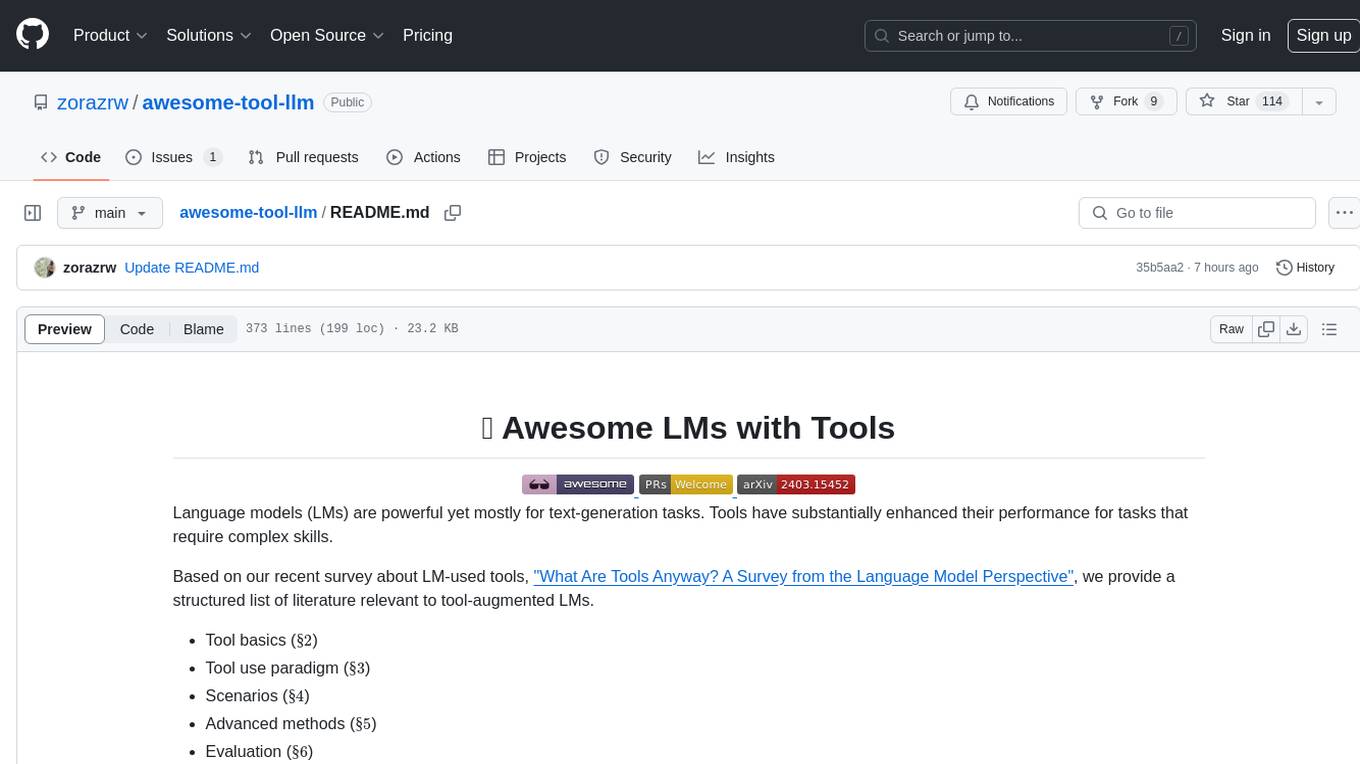
awesome-tool-llm
This repository focuses on exploring tools that enhance the performance of language models for various tasks. It provides a structured list of literature relevant to tool-augmented language models, covering topics such as tool basics, tool use paradigm, scenarios, advanced methods, and evaluation. The repository includes papers, preprints, and books that discuss the use of tools in conjunction with language models for tasks like reasoning, question answering, mathematical calculations, accessing knowledge, interacting with the world, and handling non-textual modalities.
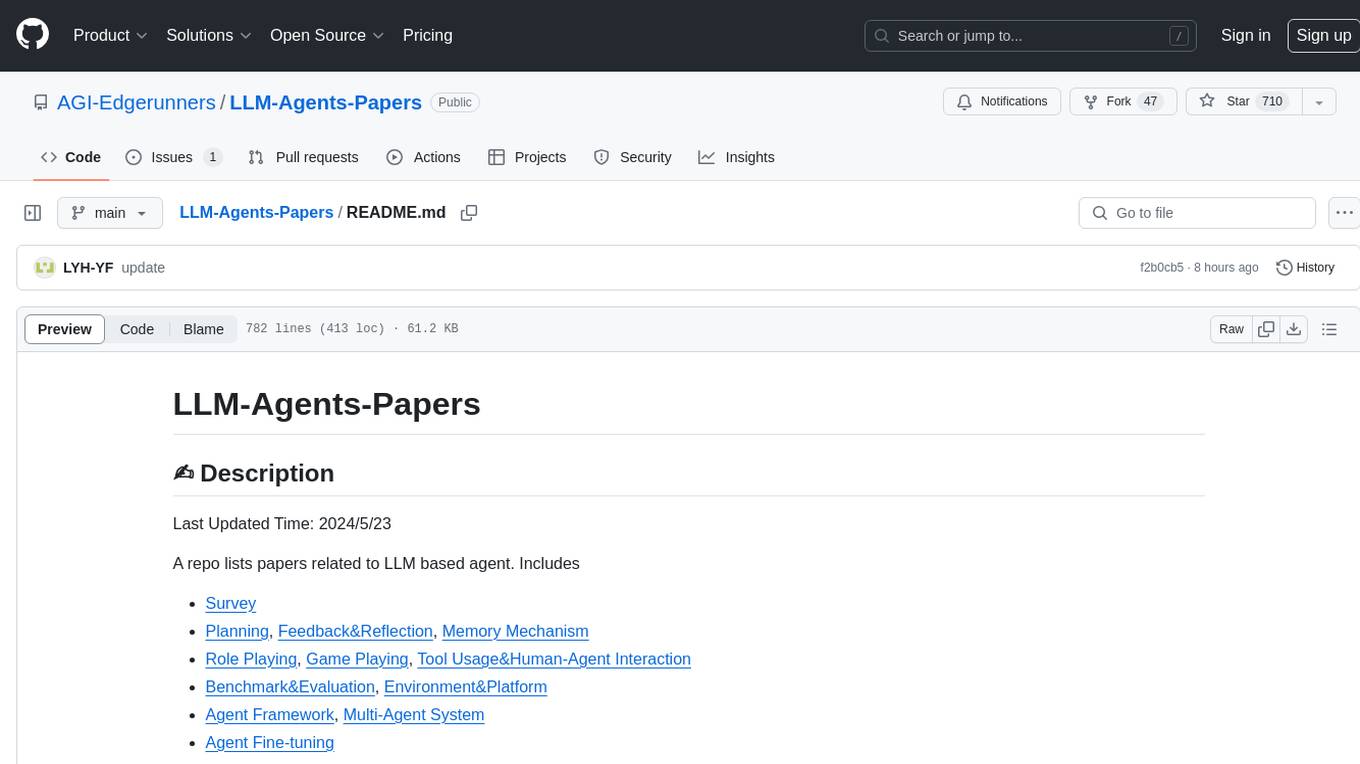
LLM-Agents-Papers
A repository that lists papers related to Large Language Model (LLM) based agents. The repository covers various topics including survey, planning, feedback & reflection, memory mechanism, role playing, game playing, tool usage & human-agent interaction, benchmark & evaluation, environment & platform, agent framework, multi-agent system, and agent fine-tuning. It provides a comprehensive collection of research papers on LLM-based agents, exploring different aspects of AI agent architectures and applications.
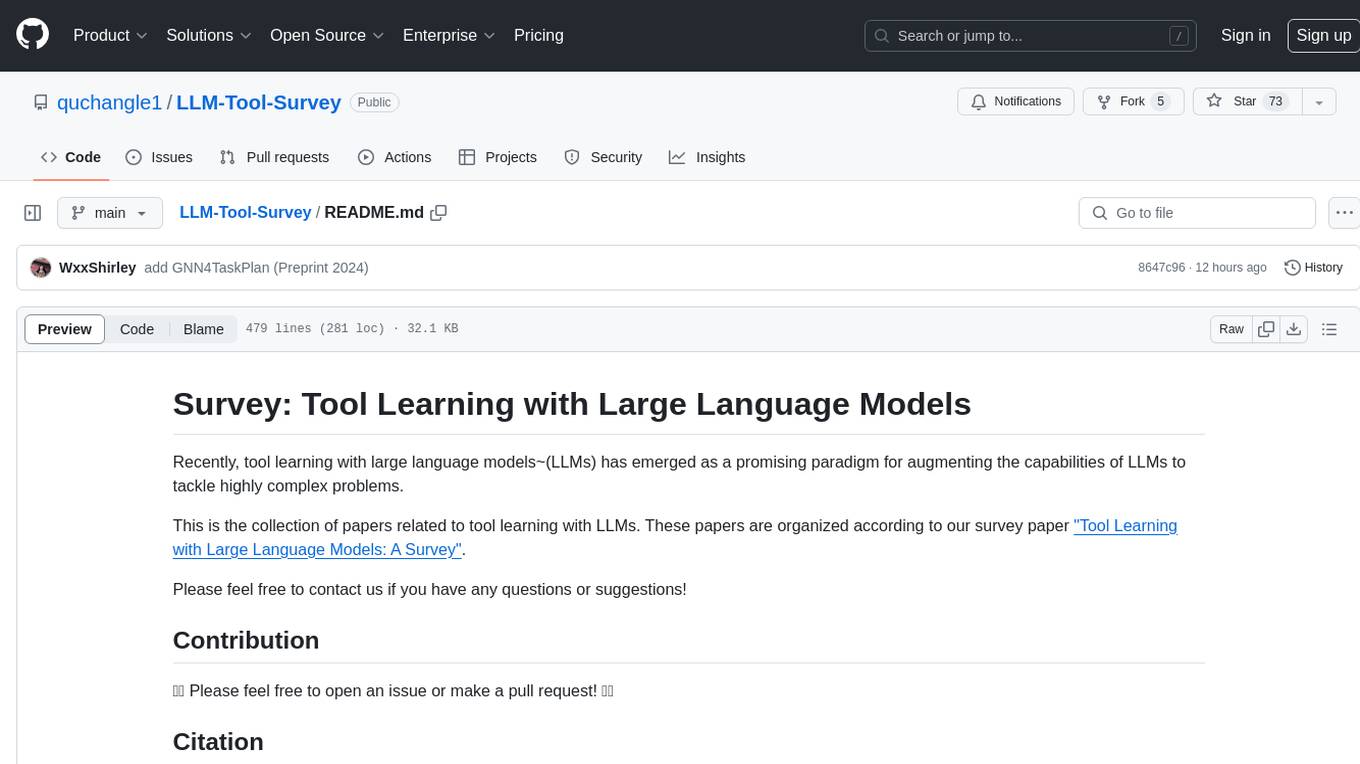
LLM-Tool-Survey
This repository contains a collection of papers related to tool learning with large language models (LLMs). The papers are organized according to the survey paper 'Tool Learning with Large Language Models: A Survey'. The survey focuses on the benefits and implementation of tool learning with LLMs, covering aspects such as task planning, tool selection, tool calling, response generation, benchmarks, evaluation, challenges, and future directions in the field. It aims to provide a comprehensive understanding of tool learning with LLMs and inspire further exploration in this emerging area.

ciso-assistant-community
CISO Assistant is a tool that helps organizations manage their cybersecurity posture and compliance. It provides a centralized platform for managing security controls, threats, and risks. CISO Assistant also includes a library of pre-built frameworks and tools to help organizations quickly and easily implement best practices.
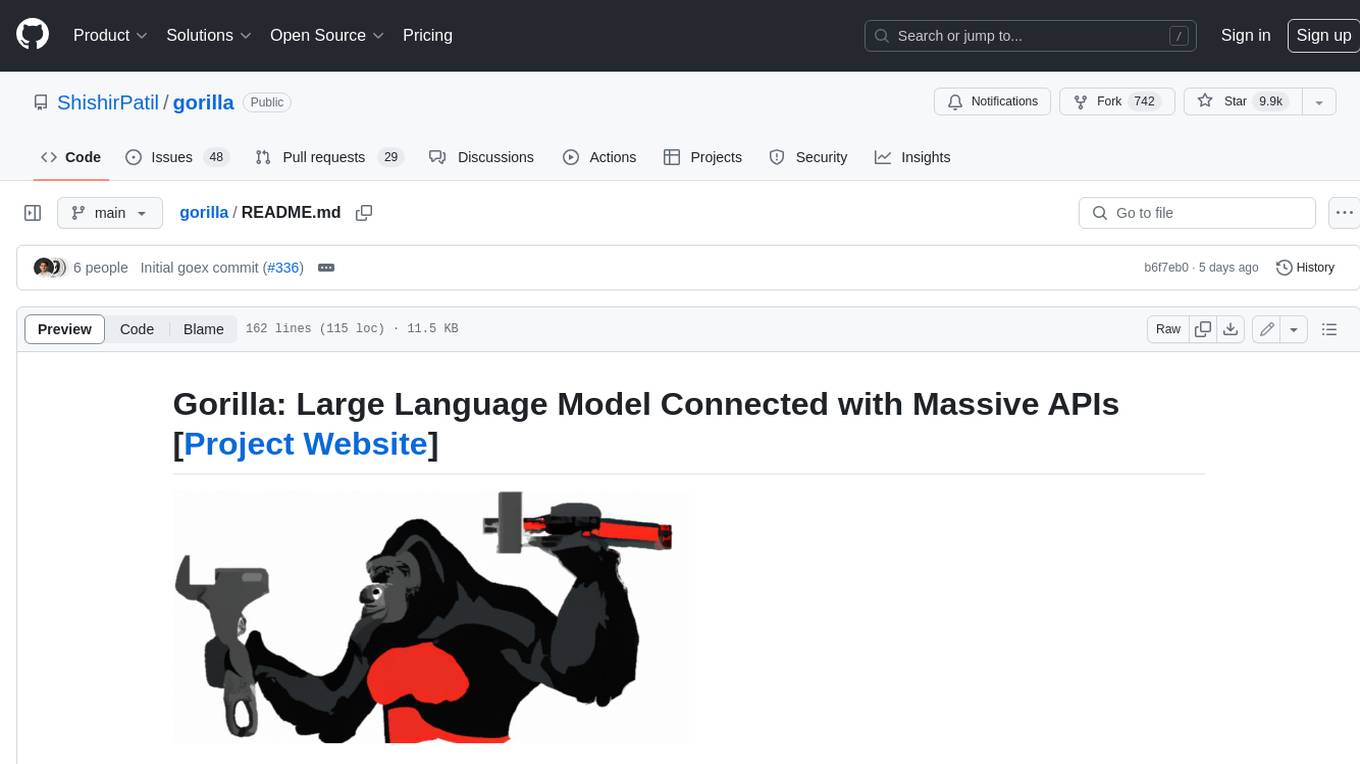
gorilla
Gorilla is a tool that enables LLMs to use tools by invoking APIs. Given a natural language query, Gorilla comes up with the semantically- and syntactically- correct API to invoke. With Gorilla, you can use LLMs to invoke 1,600+ (and growing) API calls accurately while reducing hallucination. Gorilla also releases APIBench, the largest collection of APIs, curated and easy to be trained on!
20 - OpenAI Gpts
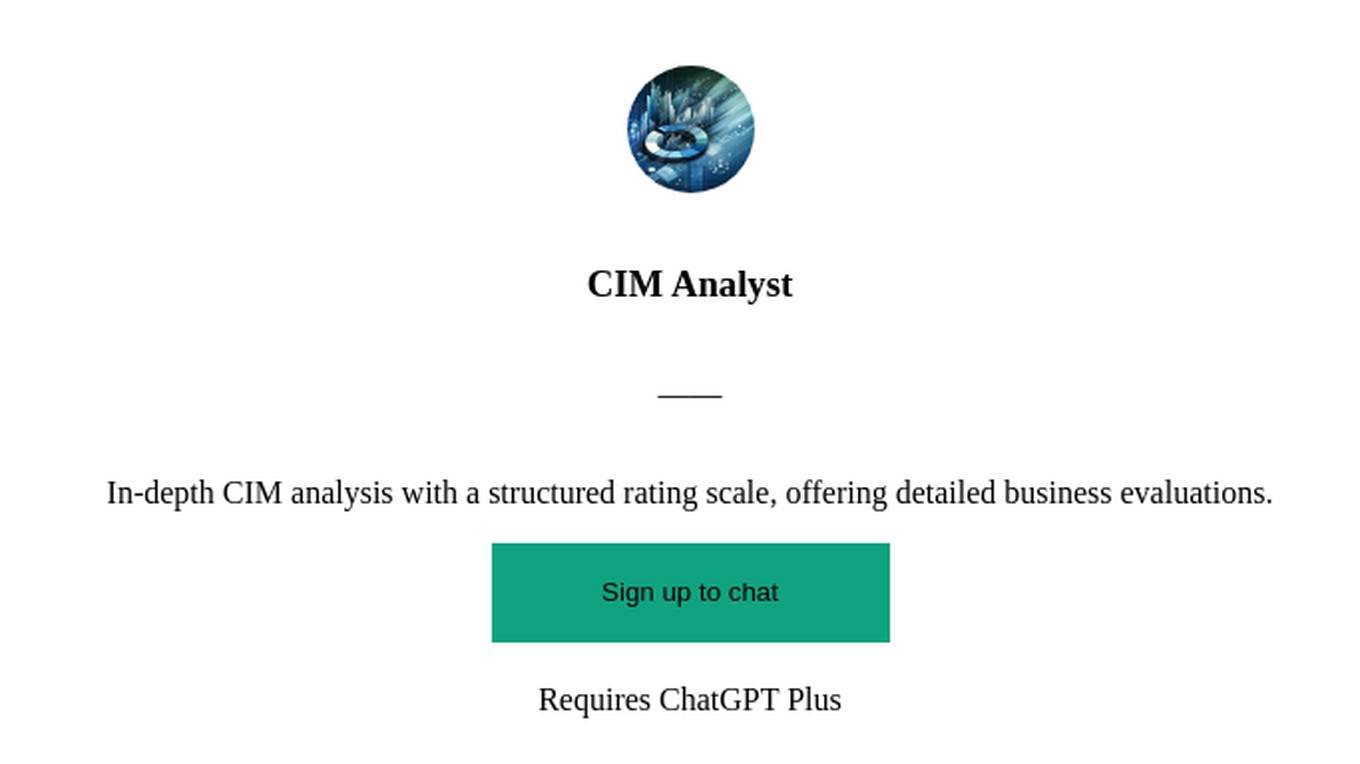
CIM Analyst
In-depth CIM analysis with a structured rating scale, offering detailed business evaluations.
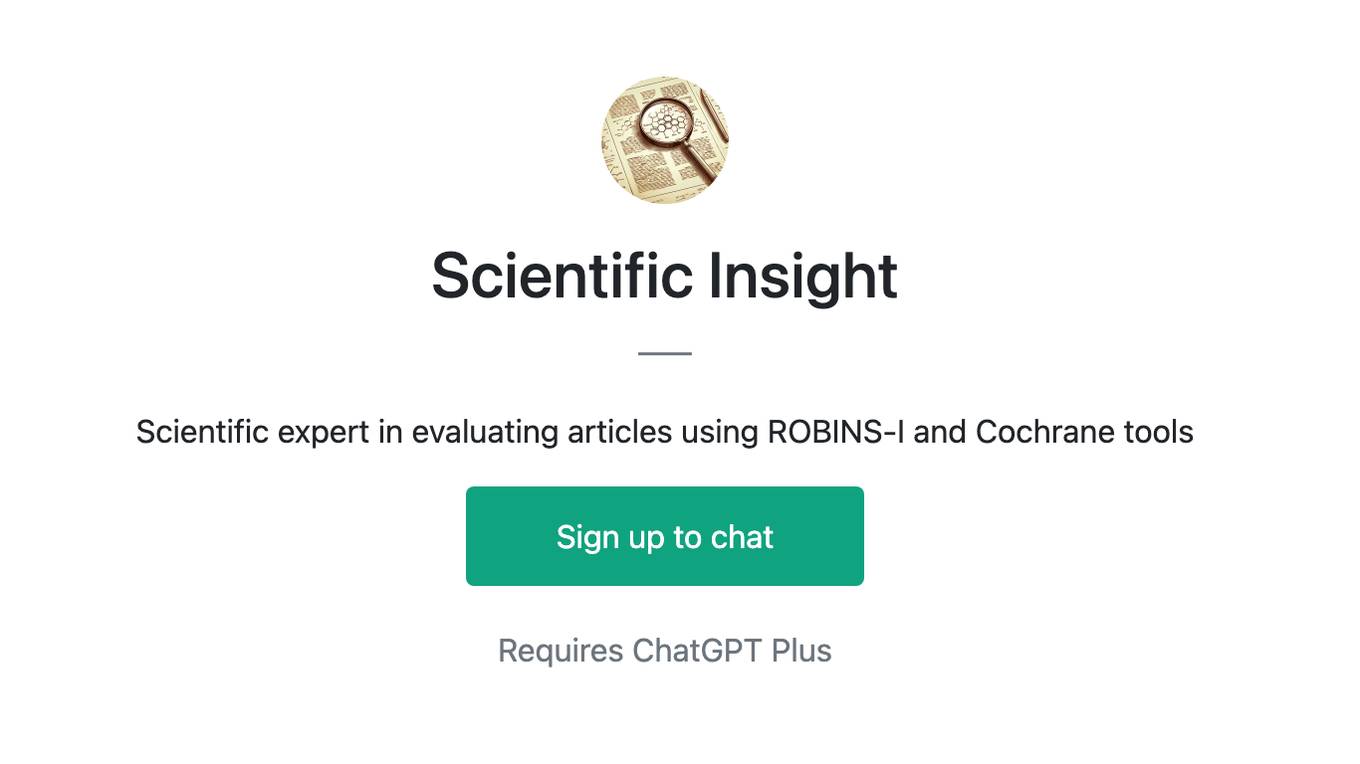
Scientific Insight
Scientific expert in evaluating articles using ROBINS-I and Cochrane tools
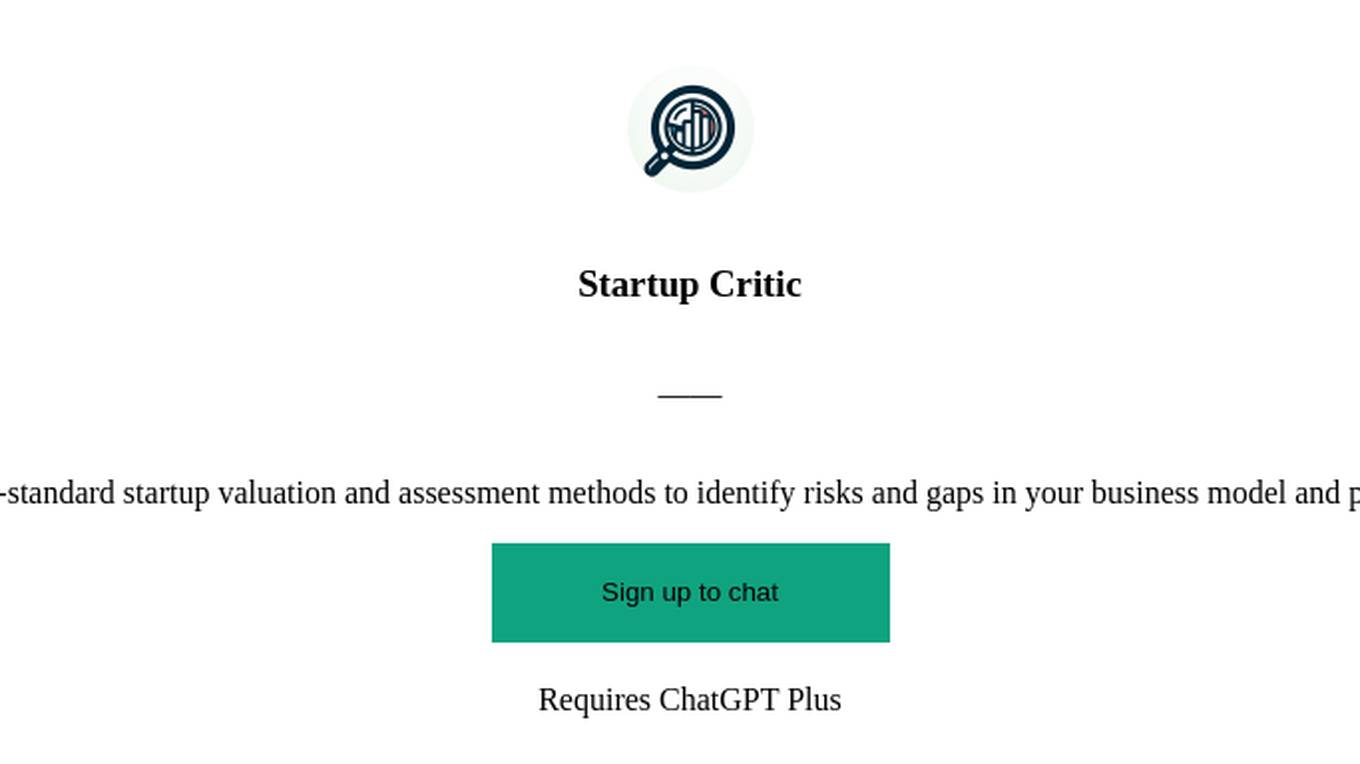
Startup Critic
Apply gold-standard startup valuation and assessment methods to identify risks and gaps in your business model and product ideas.
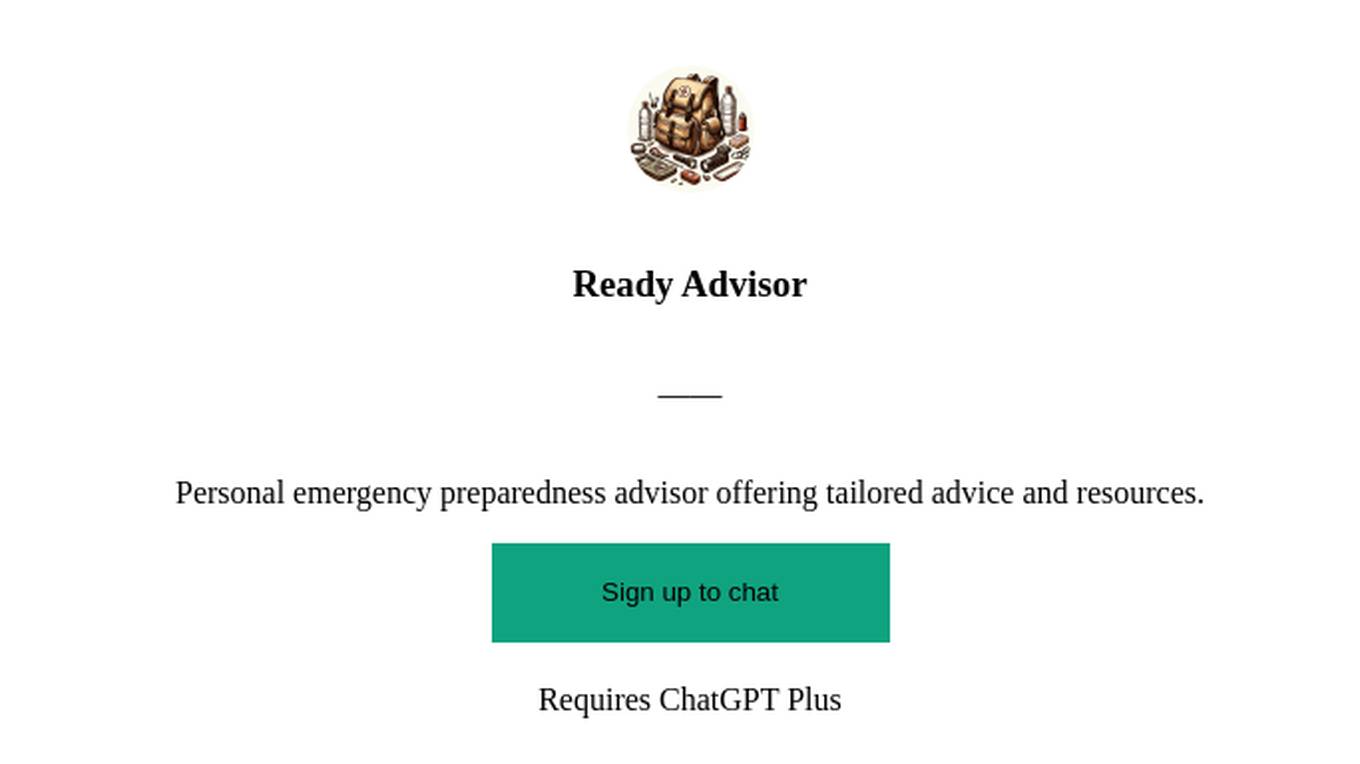
Ready Advisor
Personal emergency preparedness advisor offering tailored advice and resources.
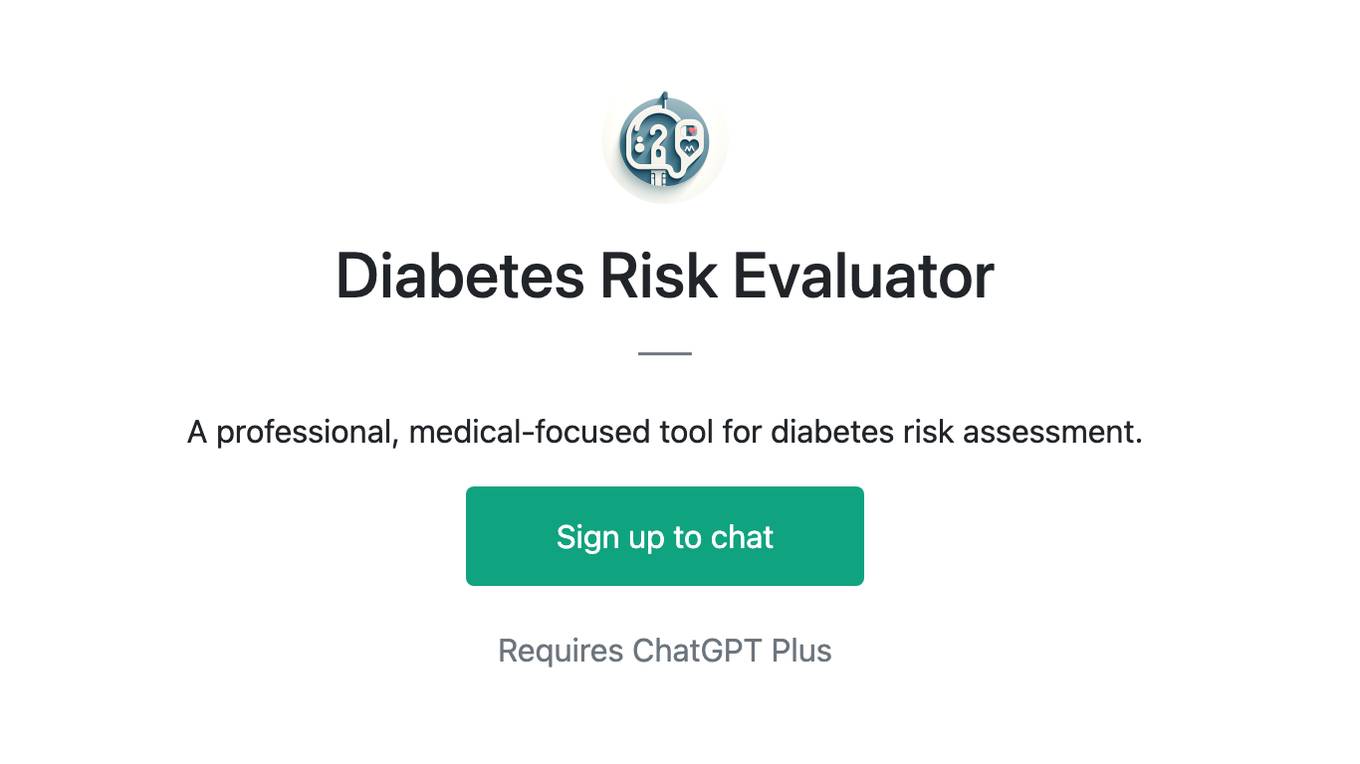
Diabetes Risk Evaluator
A professional, medical-focused tool for diabetes risk assessment.
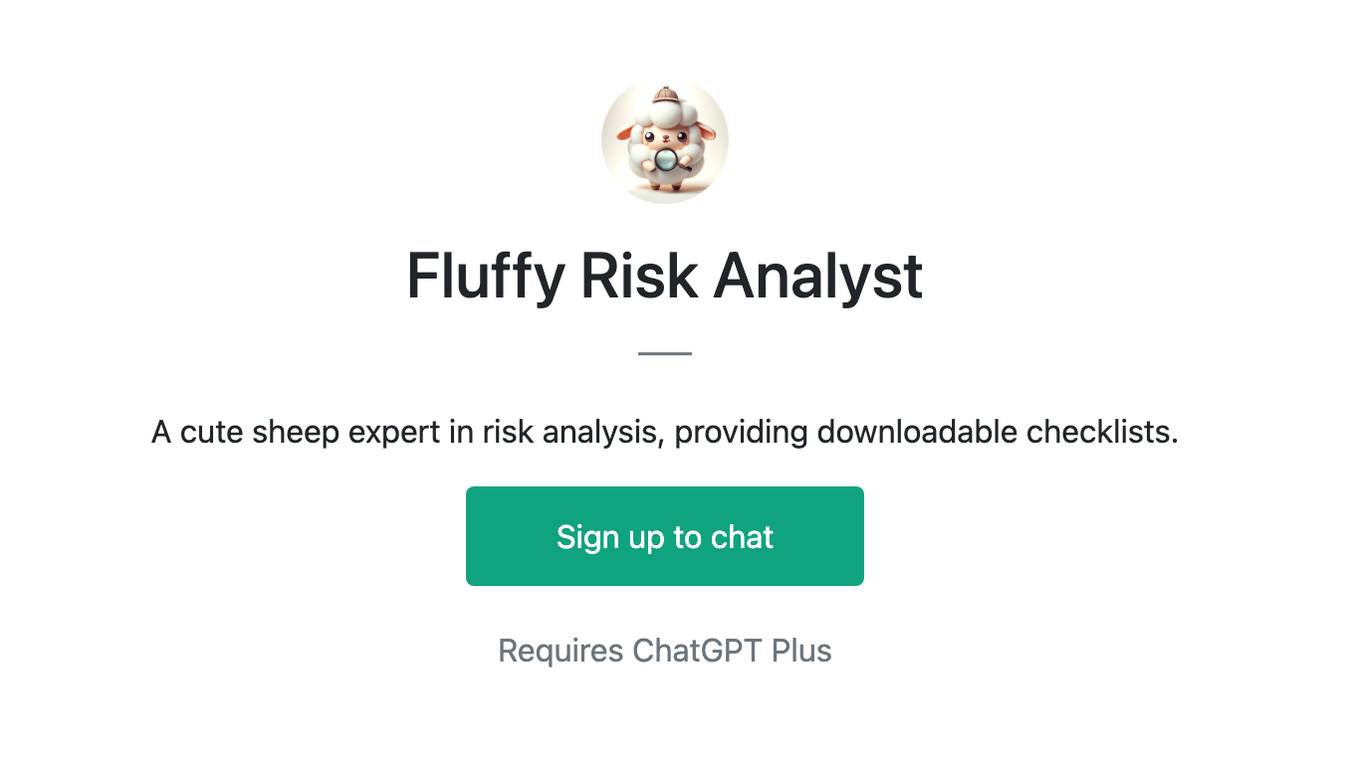
Fluffy Risk Analyst
A cute sheep expert in risk analysis, providing downloadable checklists.
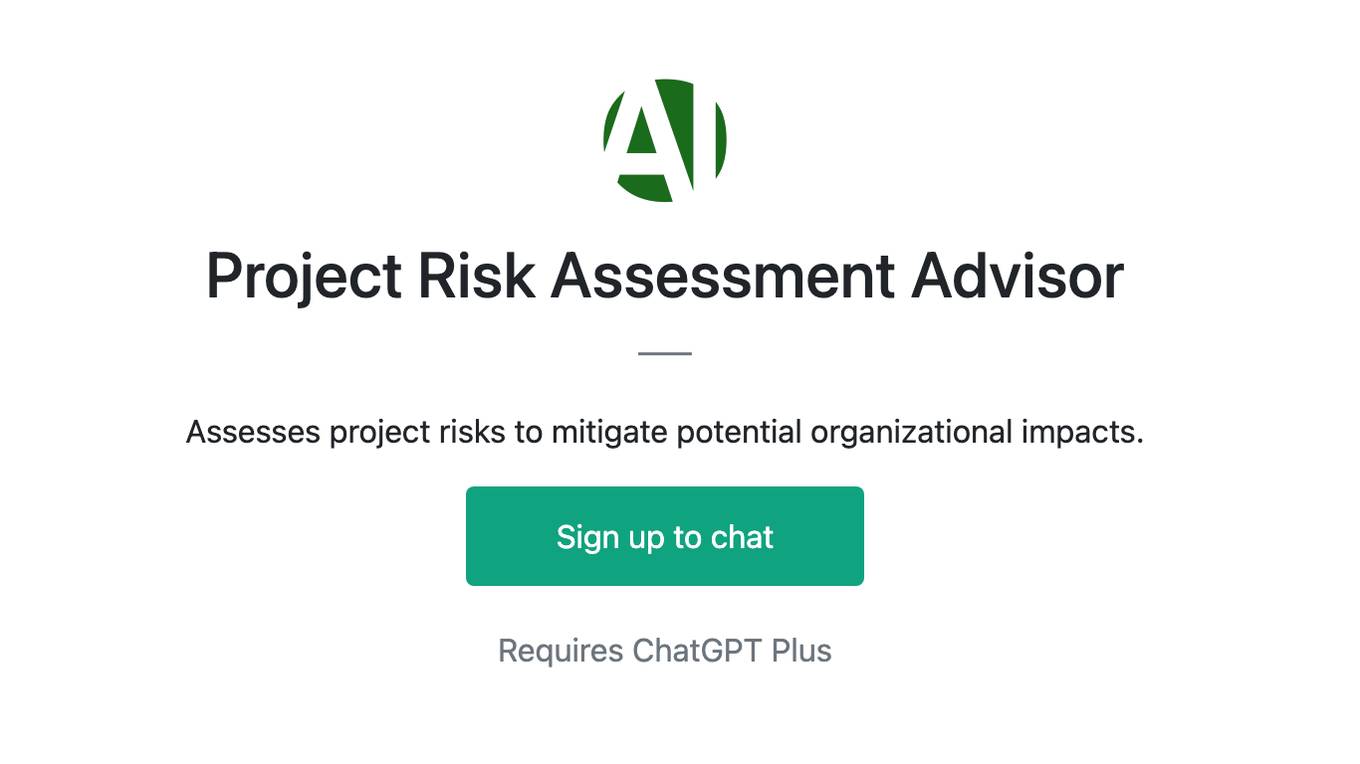
Project Risk Assessment Advisor
Assesses project risks to mitigate potential organizational impacts.
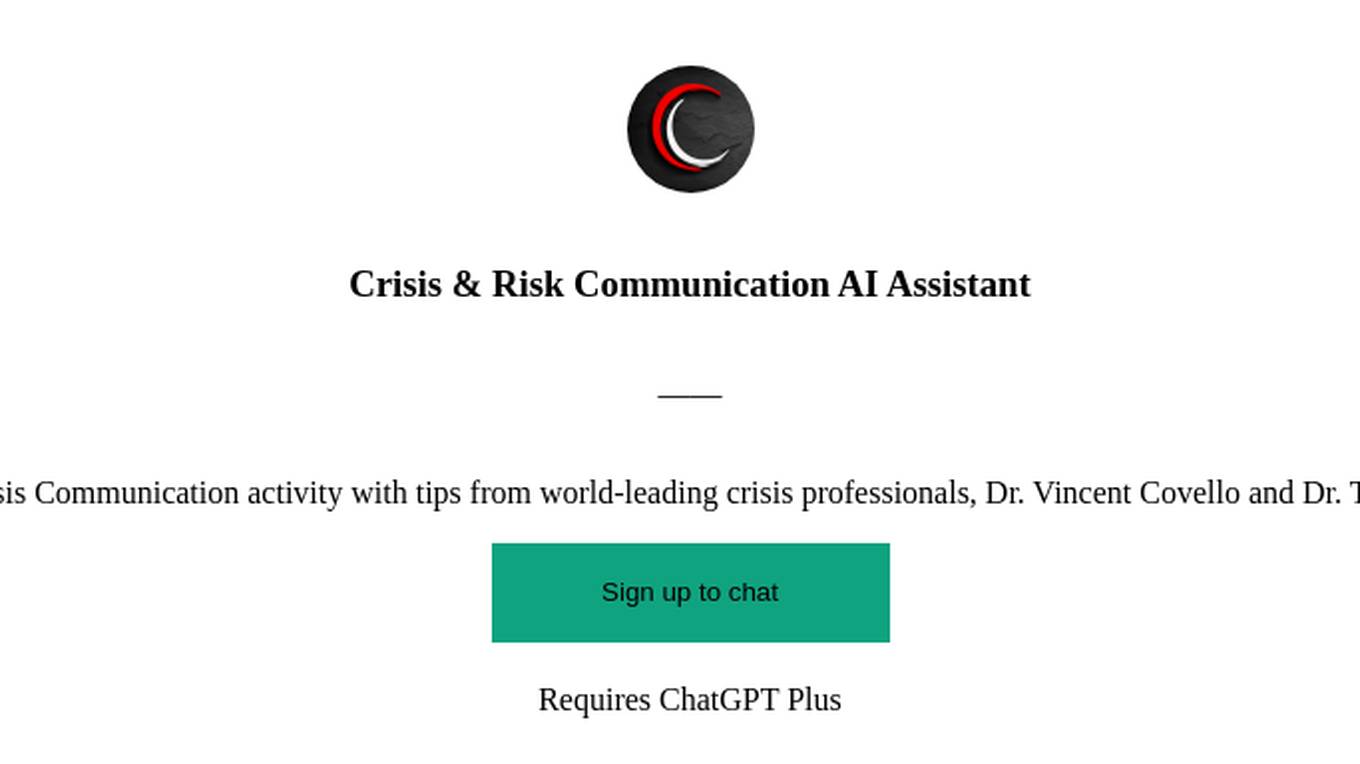
Crisis & Risk Communication AI Assistant
Guide your Crisis Communication activity with tips from world-leading crisis professionals, Dr. Vincent Covello and Dr. Timothy Coombs.
